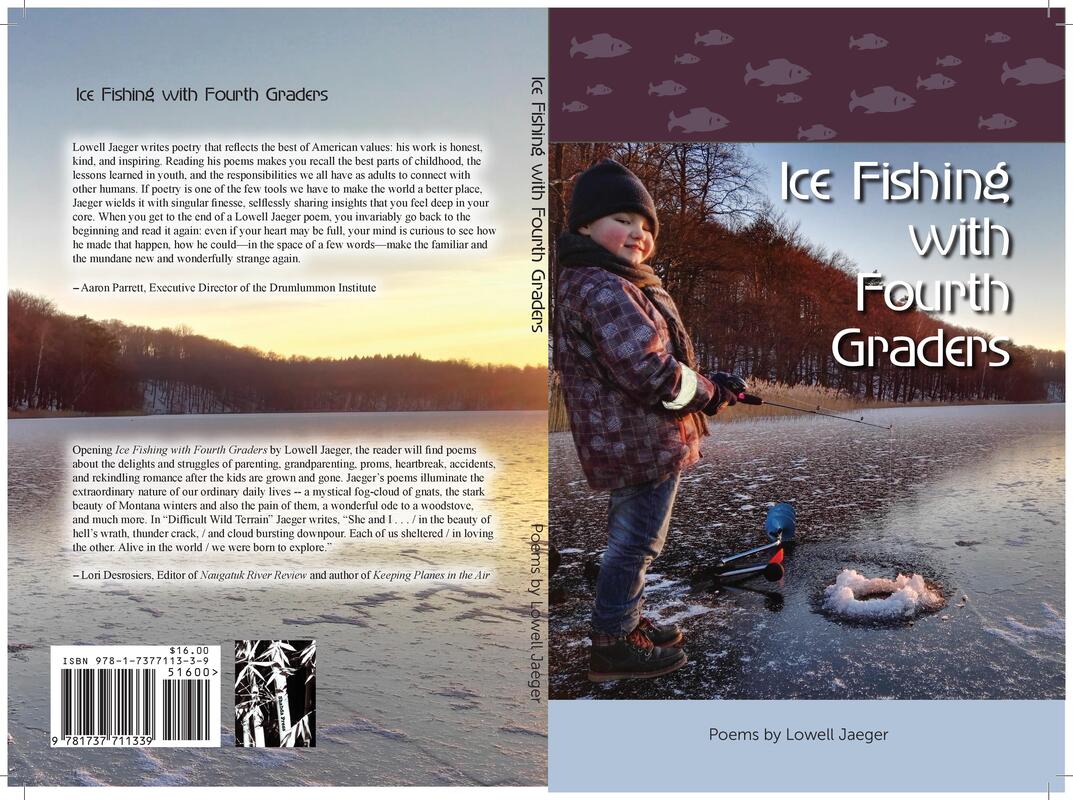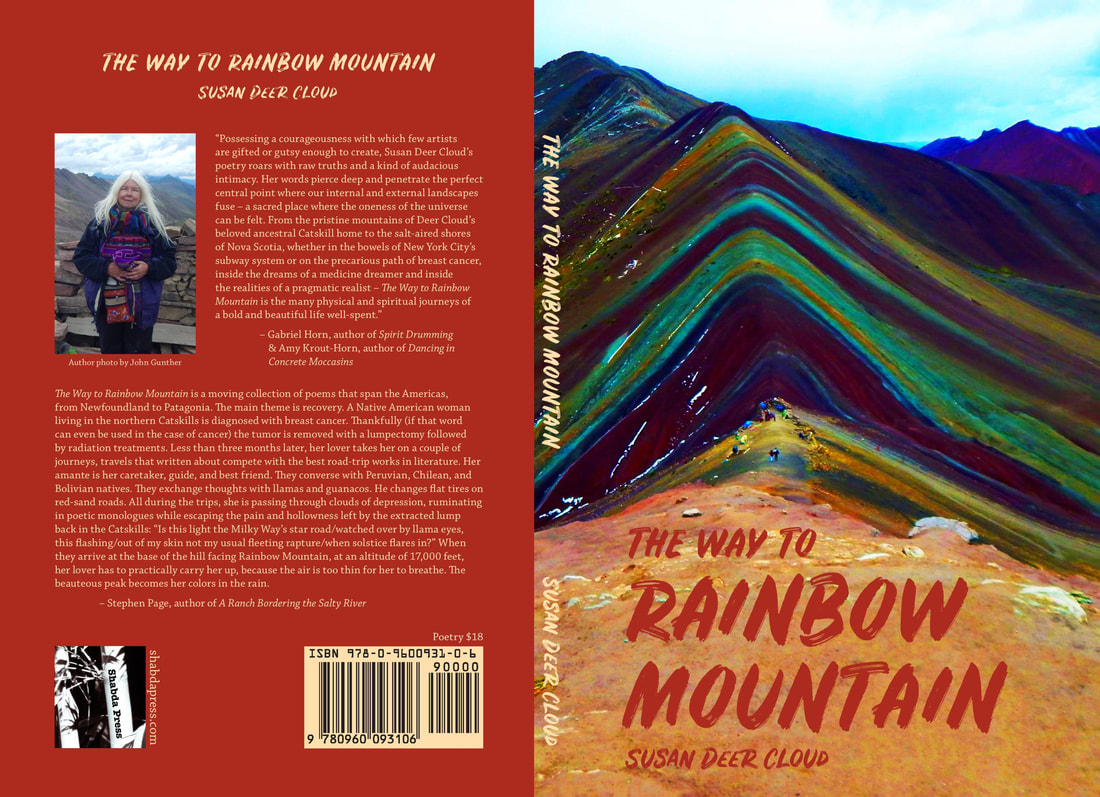If you are purchasing books for a library, a bookstore, or a school or if you are a Shabda Press author,
please contact Shabda Press for special discounts.
please contact Shabda Press for special discounts.
Distance: Tan-Ku Sequences & Sets by Mariko Kitakubo and Deborah P Kolodji
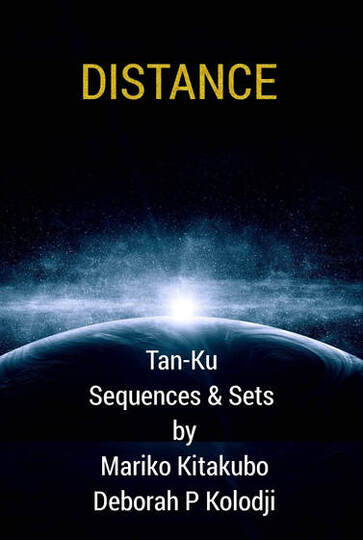
ISBN: 978-1-7377113-6-0
$18 ORDER on Amazon https://a.co/d/ekhsTUt
“Dynamic, lyrical, and nuanced, this collection is simply delightful. The twin functions of poetry as intimate dialogue and a form of play between friends are both deeply rooted in the tanka as well as the haiku. In these sequences, we are able to enjoy the interplay as two masters of their respective forms explore the rich intersection between the two genres, creating something that is both familiar and entirely new.” --Clayton Beach, Co-editor of Heliosparrow Poetry Journal
"By linking tanka and haiku together in Distance, Kitakubo and Kolodji blow the doors open to all the possibilities. In combining these two long-standing literary traditions, the two authors have explored the depth and scope of how the forms can build upon each other to create something fresh and new. While staying true to the spirit of each form, Kitakubo and Kolodji link and explore not just their poems, but their lives and their friendship." --Bryan Rickert, President, Haiku Society of America
Mariko Kitakubo is a tanka poet/tanka reading performer born in Tokyo (4, Oct. 1959) and living in Mitaka-city, Tokyo. Mariko has published six books of tanka including three bilingual ones, On This Same Star, Cicada Forest and INDIGO. She has also produced a CD of her tanka titled “Messages.” Mariko is an experienced performer who has presented her poetry on at least 238 occasions, 181 of them overseas (April 2023) in 54 cities around the world, including the US, Canada, Australia, India, France, Germany, Portugal, UK, Tanzania, Switzerland, Bulgaria, and Sweden. Mariko hopes to encourage more poetry lovers worldwide to appreciate and practice tanka. URL: https://www.en.kitakubo.com
Deborah P Kolodji is the Moderator of the Southern California Haiku Study Group, the California Regional Coordinator for the Haiku Society of America, and a member of the board of directors for Haiku North America. She has a degree in mathematics from the University of Southern California. With over 1000 published haiku to her name, her first full-length book of haiku and senryu, highway of sleeping towns, from Shabda Press, was awarded a Touchstone Distinguished Book Award from The Haiku Foundation. Her e-chapbook, tug of a black hole, won 2nd Place in the Elgin Awards from the Science Fiction and Fantasy Poetry Association. She finds inspiration in the beaches, mountains, deserts, gardens, and urban life of Los Angeles County.
$18 ORDER on Amazon https://a.co/d/ekhsTUt
“Dynamic, lyrical, and nuanced, this collection is simply delightful. The twin functions of poetry as intimate dialogue and a form of play between friends are both deeply rooted in the tanka as well as the haiku. In these sequences, we are able to enjoy the interplay as two masters of their respective forms explore the rich intersection between the two genres, creating something that is both familiar and entirely new.” --Clayton Beach, Co-editor of Heliosparrow Poetry Journal
"By linking tanka and haiku together in Distance, Kitakubo and Kolodji blow the doors open to all the possibilities. In combining these two long-standing literary traditions, the two authors have explored the depth and scope of how the forms can build upon each other to create something fresh and new. While staying true to the spirit of each form, Kitakubo and Kolodji link and explore not just their poems, but their lives and their friendship." --Bryan Rickert, President, Haiku Society of America
Mariko Kitakubo is a tanka poet/tanka reading performer born in Tokyo (4, Oct. 1959) and living in Mitaka-city, Tokyo. Mariko has published six books of tanka including three bilingual ones, On This Same Star, Cicada Forest and INDIGO. She has also produced a CD of her tanka titled “Messages.” Mariko is an experienced performer who has presented her poetry on at least 238 occasions, 181 of them overseas (April 2023) in 54 cities around the world, including the US, Canada, Australia, India, France, Germany, Portugal, UK, Tanzania, Switzerland, Bulgaria, and Sweden. Mariko hopes to encourage more poetry lovers worldwide to appreciate and practice tanka. URL: https://www.en.kitakubo.com
Deborah P Kolodji is the Moderator of the Southern California Haiku Study Group, the California Regional Coordinator for the Haiku Society of America, and a member of the board of directors for Haiku North America. She has a degree in mathematics from the University of Southern California. With over 1000 published haiku to her name, her first full-length book of haiku and senryu, highway of sleeping towns, from Shabda Press, was awarded a Touchstone Distinguished Book Award from The Haiku Foundation. Her e-chapbook, tug of a black hole, won 2nd Place in the Elgin Awards from the Science Fiction and Fantasy Poetry Association. She finds inspiration in the beaches, mountains, deserts, gardens, and urban life of Los Angeles County.
Pasadena Rose Poets Poetry Collection 2022: Not So Perfect Storm edited by Gerda Govine Ituarte
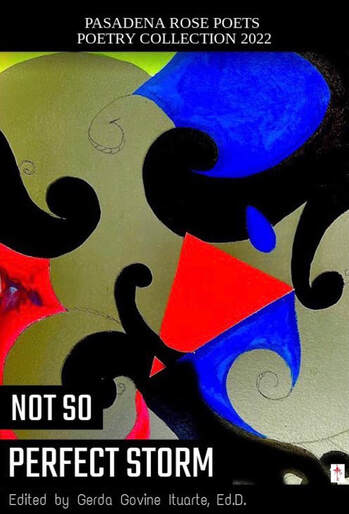
Our first publication, Pasadena Rose Poets Poetry Collection 2019 Reflection. Resistance. Reckoning. Resurrection. was published in September prior to COVID-19 initial invasion. To celebrate our 6th Anniversary, July 2022, we decided to launch our second book, Pasadena Rose Poets Poetry Collection 2022 Not So Perfect Storm. Our journey was shaped by unchartered terrain which caused us to keep adjusting and reinventing, laced with a litany of surprising challenges, chaos, and change. Not only in our communities, but all over the world. Illness and death snatched family and friends, economic hardships hunkered down; ravaging wildfires multiplied; January 6th riot erupted; murder of George Floyd and rare guilty verdict, protests mushroomed; appointment of Justice Ketanji Brown to the US Supreme Court joyful; and the continuing war of genocide in Ukraine.
We continued to read, write, publish, create, and stay connected with each other and our communities while exploring and observing new experiences within reach woven with threads of randomness. A bird fly so close you feel the warm air from wings enter your ear; walking stop, look down, a shiny dime glistens at your feet, and encounter a bear in your dreams as hint of danger dissolves when you say No! No! the bear walks away.
Not So Perfect Storm. Our saving grace is the urge and need to write, to document what we see, and feel since our work mirrors life real or imagined. The first gift of the day is the fact that we wake up.
Included in this beautiful and powerful collection are poems by Pasadena Rose Poets Damian, Kate Gale, Hazel Clayton Harrison, Gerda Govine Ituarte, Shahe Mankerian, Toni Mosley, Carla Sameth, Annette Wong and Teresa Mei Chuc.
Order Pasadena Rose Poets Poetry Collection 2022: Not So Perfect Storm on Barnes and Noble and Amazon
We continued to read, write, publish, create, and stay connected with each other and our communities while exploring and observing new experiences within reach woven with threads of randomness. A bird fly so close you feel the warm air from wings enter your ear; walking stop, look down, a shiny dime glistens at your feet, and encounter a bear in your dreams as hint of danger dissolves when you say No! No! the bear walks away.
Not So Perfect Storm. Our saving grace is the urge and need to write, to document what we see, and feel since our work mirrors life real or imagined. The first gift of the day is the fact that we wake up.
Included in this beautiful and powerful collection are poems by Pasadena Rose Poets Damian, Kate Gale, Hazel Clayton Harrison, Gerda Govine Ituarte, Shahe Mankerian, Toni Mosley, Carla Sameth, Annette Wong and Teresa Mei Chuc.
Order Pasadena Rose Poets Poetry Collection 2022: Not So Perfect Storm on Barnes and Noble and Amazon
Ice Fishing with Fourth Graders by Lowell Jaeger
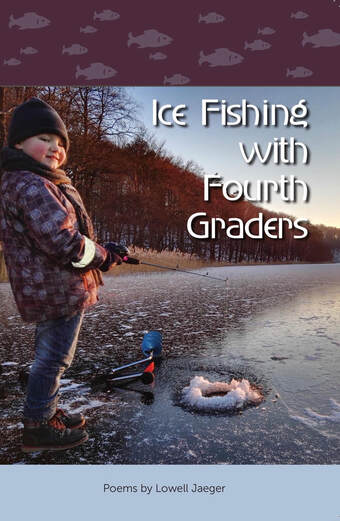
Please email [email protected] to order directly.
"Opening Ice Fishing with Fourth Graders by Lowell Jaeger, the reader will find poems about the delights and struggles of parenting, grandparenting, proms, heartbreak, accidents, and rekindling romance after the kids are grown and gone. Jaeger's poems illuminate the extraordinary nature of our ordinary daily lives -- a mystical fog-cloud of gnats, the stark beauty of Montana winters and also the pain of them, a wonderful ode to a woodstove, and much more. In “Difficult Wild Terrain” Jaeger writes, “She and I . . . / in the beauty of hell’s wrath, thunder crack, / and cloud bursting downpour. Each of us sheltered / in loving the other. Alive in the world / we were born to explore.'" -- Lori Desrosiers, Editor of Naugatuk River Review and author of Keeping Planes in the Air
"Lowell Jaeger writes poetry that reflects the best of American values: his work is honest, kind, and inspiring. Reading his poems makes you recall the best parts of childhood, the lessons learned in youth, and the responsibilities we all have as adults to connect with other humans. If poetry is one of the few tools we have to make the world a better place, Jaeger wields it with singular finesse, selflessly sharing insights that you feel deep in your core. When you get to the end of a Lowell Jaeger poem, you invariably go back to the beginning and read it again: even if your heart may be full, your mind is curious to see how he made that happen, how he could—in the space of a few words—make the familiar and the mundane new and wonderfully strange again." -- Aaron Parrett, Executive Director of the Drumlummon Institute
"Opening Ice Fishing with Fourth Graders by Lowell Jaeger, the reader will find poems about the delights and struggles of parenting, grandparenting, proms, heartbreak, accidents, and rekindling romance after the kids are grown and gone. Jaeger's poems illuminate the extraordinary nature of our ordinary daily lives -- a mystical fog-cloud of gnats, the stark beauty of Montana winters and also the pain of them, a wonderful ode to a woodstove, and much more. In “Difficult Wild Terrain” Jaeger writes, “She and I . . . / in the beauty of hell’s wrath, thunder crack, / and cloud bursting downpour. Each of us sheltered / in loving the other. Alive in the world / we were born to explore.'" -- Lori Desrosiers, Editor of Naugatuk River Review and author of Keeping Planes in the Air
"Lowell Jaeger writes poetry that reflects the best of American values: his work is honest, kind, and inspiring. Reading his poems makes you recall the best parts of childhood, the lessons learned in youth, and the responsibilities we all have as adults to connect with other humans. If poetry is one of the few tools we have to make the world a better place, Jaeger wields it with singular finesse, selflessly sharing insights that you feel deep in your core. When you get to the end of a Lowell Jaeger poem, you invariably go back to the beginning and read it again: even if your heart may be full, your mind is curious to see how he made that happen, how he could—in the space of a few words—make the familiar and the mundane new and wonderfully strange again." -- Aaron Parrett, Executive Director of the Drumlummon Institute
Altadena Literary Review 2020 edited by Teresa Mei Chuc & Hazel Clayton Harrison
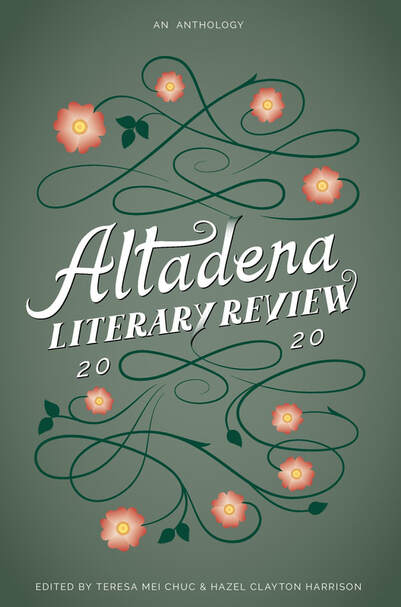
"The voices in the Altadena Literary Review 2020 are diverse and beautiful as the flora and fauna of Tovaangar, the ancestral land of the Tongva people, which includes Los Angeles. In this collection are the poetry and prose of the people we see every day who also carry poems within their hearts...from people experiencing houselessness to the youth to your neighbor. We are grateful to bring voices of poets/writers in this book writing words, in addition to English, in the Tongva language, Nahuatl language, Spanish, Vietnamese, and Chinese. Within this diversity is the song of life, death, suffering, hope and joy reminding us how connected we are to each other and life on this planet and the universe." --Teresa Mei Chuc, Editor-in-Chief, Altadena Poet Laureate 2018 to 2020
"When Teresa and I started our journey as co-Altadena poets laureate in 2018, we had no idea of the opportunities and challenges our new titles would bring. Since then we have grown tremendously as poets, publishers and champions for the literary arts.
The Altadena Literary Review 2020 represents the culmination of two years of our efforts to promote poetry and letters, and serves as a historical record of our vision to publish a literary journal that upholds excellence and reflects the diverse voices of not only the Altadena and Pasadena communities, but of greater Los Angeles. Thus, within these pages you will hear a chorus of multi-ethnic voices, as well as voices that represent members of the LGBTQ communities and different socio-economic groups, from those living in million dollar manors to those living in tents. You will hear their love songs and laments, their ditties, dirges, and dreams. By listening we hope you will not only develop a better understanding of the human condition, but a greater empathy and compassion for all of humankind." --Hazel Clayton Harrison, Editor, Altadena Poet Laureate 2018--2020
"If the classic elegance of the native rose on this book’s cover doesn’t draw you in…And if the quality of the 116 authors presented here —Poets Laureate, Pushcart Prize Nominees, national award winners, professors, book authors, editors, performance poets, and new writers bursting with inspiration—doesn’t draw you in…And if the deft blending of poetry and prose, as the Table of Contents shows, doesn’t draw you in…THEN LET THE MAGIC OF THEIR WORDS wash like healing waters over you: their humanity, wisdom, melodies, elegies, the outpouring of their hearts and souls recounting hope, love, and loss that resonate with all of us, because these writers ARE all of us." --Thelma T. Reyna, National Award-Winning Writer, Author, Dearest Papa: A Memoir in Poems
Purchase the Altadena Literary Review 2020 on Amazon and Barnes & Noble. Available in print and Kindle ebook formats.
"When Teresa and I started our journey as co-Altadena poets laureate in 2018, we had no idea of the opportunities and challenges our new titles would bring. Since then we have grown tremendously as poets, publishers and champions for the literary arts.
The Altadena Literary Review 2020 represents the culmination of two years of our efforts to promote poetry and letters, and serves as a historical record of our vision to publish a literary journal that upholds excellence and reflects the diverse voices of not only the Altadena and Pasadena communities, but of greater Los Angeles. Thus, within these pages you will hear a chorus of multi-ethnic voices, as well as voices that represent members of the LGBTQ communities and different socio-economic groups, from those living in million dollar manors to those living in tents. You will hear their love songs and laments, their ditties, dirges, and dreams. By listening we hope you will not only develop a better understanding of the human condition, but a greater empathy and compassion for all of humankind." --Hazel Clayton Harrison, Editor, Altadena Poet Laureate 2018--2020
"If the classic elegance of the native rose on this book’s cover doesn’t draw you in…And if the quality of the 116 authors presented here —Poets Laureate, Pushcart Prize Nominees, national award winners, professors, book authors, editors, performance poets, and new writers bursting with inspiration—doesn’t draw you in…And if the deft blending of poetry and prose, as the Table of Contents shows, doesn’t draw you in…THEN LET THE MAGIC OF THEIR WORDS wash like healing waters over you: their humanity, wisdom, melodies, elegies, the outpouring of their hearts and souls recounting hope, love, and loss that resonate with all of us, because these writers ARE all of us." --Thelma T. Reyna, National Award-Winning Writer, Author, Dearest Papa: A Memoir in Poems
Purchase the Altadena Literary Review 2020 on Amazon and Barnes & Noble. Available in print and Kindle ebook formats.
The Doctor Will Fix It by Bunkong Tuon

"Bunkong Tuon is saying something new and important in The Doctor Will Fix It. Exploring uncharted territory: How to raise his dazzling, bi-racial daughter to her fullest potential in today’s America. The infatuated father, himself an outsider, searches for answers in these astonishing and tender poems which ponder gender and racial identity, and create a roadmap of what it means to love. This book is honest, frustrated, tender, and human." - Alexis Rhone Fancher, author of Junkie Wife, poetry editor, Cultural Weekly
"The Doctor Will Fix It continues the poet’s primary theme: the importance of family. Tuon’s previous collection, the heart-rending Gruel deals with the refugee experience, of literally being carried out of Cambodia on his grandmother’s back and of his new life in America. And So I Was Blessed follows his new life as a husband, father, and teacher with a revealing journey to Vietnam where he learns about his late father’s roots. Now with The Doctor Will Fix It, Tuon explores the vagaries of parenting, the misgivings and joys, the problems of biracialism and small-minded prejudice and how we deal with these realities. Ultimately, the poet’s sense is that with love and hope, a better world that has such children as his will prevail. Even impossible dreams may come true." -Alan Catlin, poet, editor Misfit Magazine
Available on Amazon and Barnes & Noble
"The Doctor Will Fix It continues the poet’s primary theme: the importance of family. Tuon’s previous collection, the heart-rending Gruel deals with the refugee experience, of literally being carried out of Cambodia on his grandmother’s back and of his new life in America. And So I Was Blessed follows his new life as a husband, father, and teacher with a revealing journey to Vietnam where he learns about his late father’s roots. Now with The Doctor Will Fix It, Tuon explores the vagaries of parenting, the misgivings and joys, the problems of biracialism and small-minded prejudice and how we deal with these realities. Ultimately, the poet’s sense is that with love and hope, a better world that has such children as his will prevail. Even impossible dreams may come true." -Alan Catlin, poet, editor Misfit Magazine
Available on Amazon and Barnes & Noble
Pasadena Rose Poets Poetry Collection 2019
Reflection. Resistance. Reckoning. Resurrection.
edited by Gerda Govine Ituarte
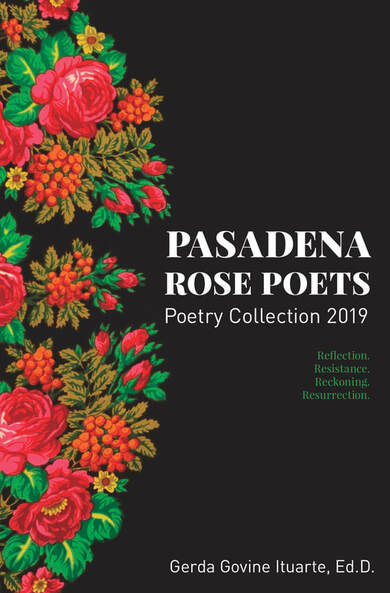
¨The Pasadena Rose Poets are “unobtrusive pause creators.” We use our words to allow humanity to pause and breathe deeply. Poetry leaves its mark—not always visible—but imprinted on us and our audience in ways that we may never know. We are a chorus of voices stretched across cultures. Poetry gifts us with a third eye and ear that slows us down to look and see, to hear murmurs and whispers that get under our skin and live in our heads until we let the words land on the page. We fly, soar as time, space and freedom joins us.
An NEA, National Endowment for the Arts, grant to the City of Pasadena Cultural Affairs Division created the winds of change that established The Pasadena Rose Poets in 2016. Nine published poets were chosen to initiate a lunchtime poetry reading program at the Pasadena Senior Center. A second program was held in the Pasadena Council Chambers. We are also know as “Citizen Poets,” who initiated and continue to read at City Council meetings since 2017. As Mayor Terry Tornek remarked at one of the Council meetings, I believe that because of the poetry readings, the meetings are more civil.¨--Gerda Govine Ituarte
The Pasadena Rose Poets:
Teresa Mei Chuc, Mel Donalson, Kate Gale, Damian Gonzalez, Hazel Clayton Harrison, Gerda Govine Ituarte, Shahé Mankerian, Toni Mosley, Carla Sameth, and Annette Wong.
Order from Amazon or Barnes & Noble
An NEA, National Endowment for the Arts, grant to the City of Pasadena Cultural Affairs Division created the winds of change that established The Pasadena Rose Poets in 2016. Nine published poets were chosen to initiate a lunchtime poetry reading program at the Pasadena Senior Center. A second program was held in the Pasadena Council Chambers. We are also know as “Citizen Poets,” who initiated and continue to read at City Council meetings since 2017. As Mayor Terry Tornek remarked at one of the Council meetings, I believe that because of the poetry readings, the meetings are more civil.¨--Gerda Govine Ituarte
The Pasadena Rose Poets:
Teresa Mei Chuc, Mel Donalson, Kate Gale, Damian Gonzalez, Hazel Clayton Harrison, Gerda Govine Ituarte, Shahé Mankerian, Toni Mosley, Carla Sameth, and Annette Wong.
Order from Amazon or Barnes & Noble
Down Freedom Road by Hazel Clayton Harrision
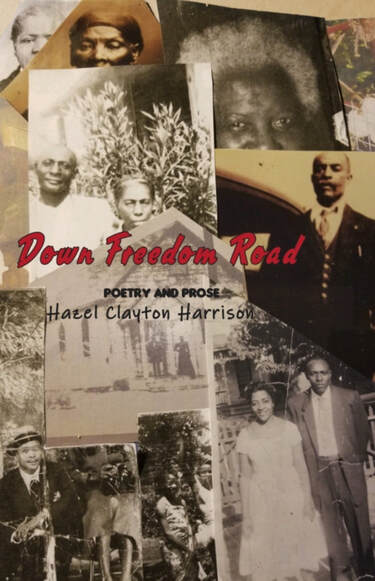
Growing up in the Ohio Valley, Hazel Clayton Harrison dreamed of becoming a writer but she knew of no black writers. At Kent State University, she majored in elementary education. After earning her master’s degree in education, she began a career in public and private education. While working as a corporate trainer, she pursued her passion for creative writing. In the 1980s her poetry and prose began to appear in various journals and anthologies including, Full Circle (editions 1-27), River Crossings, Grandfathers, A Rock Against the Wind, Coiled Serpent, Spectrum 15, and Altadena Poetry Review Anthology (2015-2019 editions). She is the author of a children’s book, The Story of Christmas Tree Lane. Her memoir, Crossing the River Ohio, was published in 2014. Now retired from the corporate arena, she operates JAH Light Media, her own editing and publishing company, and serves as the 2018-2020 Altadena Poet Laureate for community events. She is a member of the Pasadena Rose Poets and participates in poetry readings throughout Southern California.
Available on Amazon and Barnes & Noble
"Down Freedom Road is a cornucopia of universal truths about the human condition, prohibited, inspired, and inalienable. Hazel Clayton Harrison makes them universal and specific, particularly for Black Americans who have lived in a different world historically, culturally, and spiritually with reverence for the earth that sustains. Beyond ritual, reparations, and reconciliation, the poetry and prose culled in this literary gift reflect the socioeconomic injustice, hatred, racism, bigotry, and stigma placed on a people for centuries. Though the journey is often rough, jagged, perilous, and steep, until freedom is realized, you must travel Down Freedom Road. " --C. Jerome Woods, Author/Editor
"Hazel Clayton Harrison creates poetry that connects and honors her family, ancestors, and historical icons. They whisper in our ears, offer images in her dreams, and celebrate her words that bloom on the page. Lifted by her voice, her poetry stays with us—timeless—precious." --Gerda Govine Ituarte, Author
Available on Amazon and Barnes & Noble
"Down Freedom Road is a cornucopia of universal truths about the human condition, prohibited, inspired, and inalienable. Hazel Clayton Harrison makes them universal and specific, particularly for Black Americans who have lived in a different world historically, culturally, and spiritually with reverence for the earth that sustains. Beyond ritual, reparations, and reconciliation, the poetry and prose culled in this literary gift reflect the socioeconomic injustice, hatred, racism, bigotry, and stigma placed on a people for centuries. Though the journey is often rough, jagged, perilous, and steep, until freedom is realized, you must travel Down Freedom Road. " --C. Jerome Woods, Author/Editor
"Hazel Clayton Harrison creates poetry that connects and honors her family, ancestors, and historical icons. They whisper in our ears, offer images in her dreams, and celebrate her words that bloom on the page. Lifted by her voice, her poetry stays with us—timeless—precious." --Gerda Govine Ituarte, Author
OM [Other Moments] by Đặng Thân
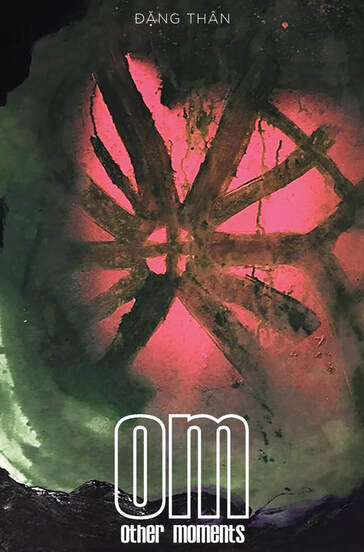
Purchase OM [Other Momenets] by Đặng Thân on Amazon and Barnes & Noble
Đặng Thân’s poetry collection OM [Other Moments] is a joyful hymn to love and life. At times humorous, at times philosophical, it offers the reader a “poetry feast” full of awe and wonder in which Thân pays tribute to his mother, his Vietnam, and all of us. — Hélène Cardona, American award-winning poet,
author of Life in Suspension, and Dreaming My Animal Selves
Open OM [Other Moments] to its rich surface beauty of the natural and physical world, and discover a thinking person's delight in complexity and fun. This collection is from one of Vietnam's best contemporary writers.
--Elizabeth Marino, American Latina poet, author of Debris: Poems & Memoir, and Ceremonies
Đặng Thân appears right here and now and raises an extraordinary voice. An artist of unique originality. In terms of poetry, Đặng Thân is a connoisseur of subtle sense of sounds.--Đặng Anh Đào, Vietnamese Professor of Literature
Đặng Thân's poetry slips on the tongue provocatively. The coming together of the rhythms and shapes of his words are sublime for the foreign ear. A truly transcultural moment.
-- Julie-Anne Boudreau, Canadian expert in transculture
Đặng Thân is successful in using connotation and black humour language to deal with real problems. He's created his own poetic style named “phạc-nhiên”, and captured the musicality in a natural language that proves himself to be an unsurpassable talent.
--Xiang Yang, renowned Taiwanese poet and winner of numerous prestigious literary awards
Đặng Thân’s poetry collection OM [Other Moments] is a joyful hymn to love and life. At times humorous, at times philosophical, it offers the reader a “poetry feast” full of awe and wonder in which Thân pays tribute to his mother, his Vietnam, and all of us. — Hélène Cardona, American award-winning poet,
author of Life in Suspension, and Dreaming My Animal Selves
Open OM [Other Moments] to its rich surface beauty of the natural and physical world, and discover a thinking person's delight in complexity and fun. This collection is from one of Vietnam's best contemporary writers.
--Elizabeth Marino, American Latina poet, author of Debris: Poems & Memoir, and Ceremonies
Đặng Thân appears right here and now and raises an extraordinary voice. An artist of unique originality. In terms of poetry, Đặng Thân is a connoisseur of subtle sense of sounds.--Đặng Anh Đào, Vietnamese Professor of Literature
Đặng Thân's poetry slips on the tongue provocatively. The coming together of the rhythms and shapes of his words are sublime for the foreign ear. A truly transcultural moment.
-- Julie-Anne Boudreau, Canadian expert in transculture
Đặng Thân is successful in using connotation and black humour language to deal with real problems. He's created his own poetic style named “phạc-nhiên”, and captured the musicality in a natural language that proves himself to be an unsurpassable talent.
--Xiang Yang, renowned Taiwanese poet and winner of numerous prestigious literary awards
The Way to Rainbow Mountain by Susan Deer Cloud

Available online at Barnes and Noble and Amazon
Susan Deer Cloud, a mixed lineage Catskill Indian, is an alumna of Goddard College (MFA) and Binghamton University (B.A. and M.A.). She has taught Creative Writing, Rhetoric and Literature at Binghamton University and Broome Community College. In April 2013 she returned to her “heart country” Catskills to dwell once more with foxes, deer, black bears, rainbow trout, bald eagles, and the ghosts of panthers and ancestors. She now lives as a full-time mountain woman, dreamer and writer in between roaming on Turtle Island and in other lands.
Deer Cloud is the recipient of various awards and fellowships, including an Elizabeth George Foundation Grant, a National Endowment for the Arts Literature Fellowship, two New York State Foundation for the Arts Fellowships, and a Chenango County Council for the Arts Individual Artist’s Grant. Some of her books are Before Language and Hunger Moon (Shabda Press); Fox Mountain, The Last Ceremony and Car Stealer (FootHills Publishing); and Braiding Starlight (Split Oak Press). Her poems, stories and essays have been published in anthologies and journals too numerous to name.
In order to get out “the voices of the voiceless,” the poet has edited three published anthologies: multicultural Confluence and Native American anthologies I Was Indian (Before Being Indian Was Cool), Volumes I & II; the 2008 Spring Issue of Yellow Medicine Review, a Journal of Indigenous Literature, Art & Thought; and the Re-Matriation Chapbook Series of Indigenous Poetry. She is a member of the international travel/peace organization SERVAS, Poets & Writers, and Associated Writing Programs (AWP). She has served on panels at writers’ conferences and given myriad poetry readings at colleges, cultural centers, coffee houses, and other venues.
Deer Cloud has spent the past few years roving with her wanderlust companion, John Gunther, in the far north of Canada’s Maritime Provinces and in South America (Chile, Argentina, Bolivia and Peru). After being diagnosed with breast cancer in May 2017, more than ever this poet is immersed in an open ended physical journey mated to a spirit quest for whatever original stardust-light draws us to each other in the most creative, tender, and enraptured ways.
Susan Deer Cloud, a mixed lineage Catskill Indian, is an alumna of Goddard College (MFA) and Binghamton University (B.A. and M.A.). She has taught Creative Writing, Rhetoric and Literature at Binghamton University and Broome Community College. In April 2013 she returned to her “heart country” Catskills to dwell once more with foxes, deer, black bears, rainbow trout, bald eagles, and the ghosts of panthers and ancestors. She now lives as a full-time mountain woman, dreamer and writer in between roaming on Turtle Island and in other lands.
Deer Cloud is the recipient of various awards and fellowships, including an Elizabeth George Foundation Grant, a National Endowment for the Arts Literature Fellowship, two New York State Foundation for the Arts Fellowships, and a Chenango County Council for the Arts Individual Artist’s Grant. Some of her books are Before Language and Hunger Moon (Shabda Press); Fox Mountain, The Last Ceremony and Car Stealer (FootHills Publishing); and Braiding Starlight (Split Oak Press). Her poems, stories and essays have been published in anthologies and journals too numerous to name.
In order to get out “the voices of the voiceless,” the poet has edited three published anthologies: multicultural Confluence and Native American anthologies I Was Indian (Before Being Indian Was Cool), Volumes I & II; the 2008 Spring Issue of Yellow Medicine Review, a Journal of Indigenous Literature, Art & Thought; and the Re-Matriation Chapbook Series of Indigenous Poetry. She is a member of the international travel/peace organization SERVAS, Poets & Writers, and Associated Writing Programs (AWP). She has served on panels at writers’ conferences and given myriad poetry readings at colleges, cultural centers, coffee houses, and other venues.
Deer Cloud has spent the past few years roving with her wanderlust companion, John Gunther, in the far north of Canada’s Maritime Provinces and in South America (Chile, Argentina, Bolivia and Peru). After being diagnosed with breast cancer in May 2017, more than ever this poet is immersed in an open ended physical journey mated to a spirit quest for whatever original stardust-light draws us to each other in the most creative, tender, and enraptured ways.
¨The Way to Rainbow Mountain is a moving collection of poems that span the Americas, from Newfoundland to Patagonia. The main theme is recovery. A Native American woman living in the northern Catskills is diagnosed with breast cancer. Thankfully (if that word can even be used in the case of cancer) the tumor is removed with a lumpectomy followed by radiation treatments. Less than three months later, her lover takes her on a couple of journeys, travels that written about compete with the best road-trip works in literature. Her amante is her caretaker, guide, and best friend. They converse with Peruvian, Chilean, and Bolivian natives. They exchange thoughts with llamas and guanacos. He changes flat tires on red-sand roads. All during the trips, she is passing through clouds of depression, ruminating in poetic monologues while escaping the pain and hollowness left by the extracted lump back in the Catskills: “Is this light the Milky Way’s star road/watched over by llama eyes, this flashing/out of my skin not my usual fleeting rapture/when solstice flares in?” When they arrive at the base of the hill facing Rainbow Mountain, at an altitude of 17,000 feet, her lover has to practically carry her up, because the air is too thin for her to breathe. The beauteous peak becomes her colors in the rain.¨ – Stephen Page, author of A Ranch Bordering the Salty River
“Possessing a courageousness with which few artists are gifted or gutsy enough to create, Susan Deer Cloud’s poetry roars with raw truths and a kind of audacious intimacy. Her words pierce deep and penetrate the perfect central point where our internal and external landscapes fuse –
a sacred place where the oneness of the universe can be felt. From the pristine mountains of Deer Cloud’s beloved ancestral Catskill home to the salt-aired shores of Nova Scotia, whether in the bowels of New York City’s subway system or on the precarious path of breast cancer, inside the dreams of a medicine dreamer and inside the realities of a pragmatic realist – The Way to Rainbow Mountain is the many physical and spiritual journeys of a bold and beautiful life well-spent.” – Gabriel Horn, author Spirit Drumming and Amy Krout-Horn, author Dancing in Concrete Moccasins
“Possessing a courageousness with which few artists are gifted or gutsy enough to create, Susan Deer Cloud’s poetry roars with raw truths and a kind of audacious intimacy. Her words pierce deep and penetrate the perfect central point where our internal and external landscapes fuse –
a sacred place where the oneness of the universe can be felt. From the pristine mountains of Deer Cloud’s beloved ancestral Catskill home to the salt-aired shores of Nova Scotia, whether in the bowels of New York City’s subway system or on the precarious path of breast cancer, inside the dreams of a medicine dreamer and inside the realities of a pragmatic realist – The Way to Rainbow Mountain is the many physical and spiritual journeys of a bold and beautiful life well-spent.” – Gabriel Horn, author Spirit Drumming and Amy Krout-Horn, author Dancing in Concrete Moccasins
Altadena Poetry Review 2019
Edited by Teresa Mei Chuc & Hazel Clayton Harrison
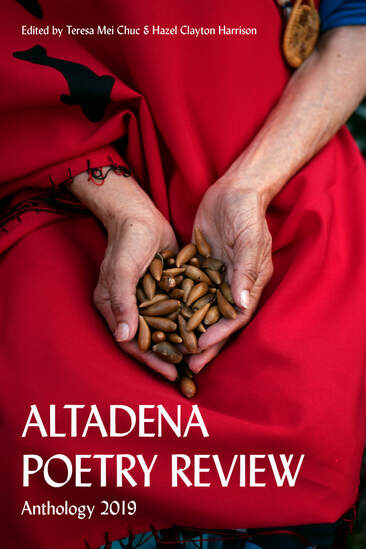
Altadena Poetry Review 2019
ISBN: 978-0-9600931-8-2
In this anthology are poetry and stories by people who live in Los Angeles, including several writers who are Tongva and whose ancestors have lived on this land for thousands of years. This book is like a woven basket made of the earth, hands, spirit, heart and patience. The poetry and stories in this anthology carry us on its back through the city, through landscapes of the mind and spirit, through the quiet and the noisy streets, through the joy and the despair of our hearts...home.
Teresa Mei Chuc, Editor-in-Chief
Purchase a copy of the Altadena Poetry Review 2019 at Vroman's Bookstore in Pasadena, California in person or online. Also available on Amazon.com and barnesandnoble.com
Cover photo by Isabel Avila
Cover design by Kristen Torralba
ISBN: 978-0-9600931-8-2
In this anthology are poetry and stories by people who live in Los Angeles, including several writers who are Tongva and whose ancestors have lived on this land for thousands of years. This book is like a woven basket made of the earth, hands, spirit, heart and patience. The poetry and stories in this anthology carry us on its back through the city, through landscapes of the mind and spirit, through the quiet and the noisy streets, through the joy and the despair of our hearts...home.
Teresa Mei Chuc, Editor-in-Chief
Purchase a copy of the Altadena Poetry Review 2019 at Vroman's Bookstore in Pasadena, California in person or online. Also available on Amazon.com and barnesandnoble.com
Cover photo by Isabel Avila
Cover design by Kristen Torralba
Someday I'd Write This Down by Lowell Jaeger
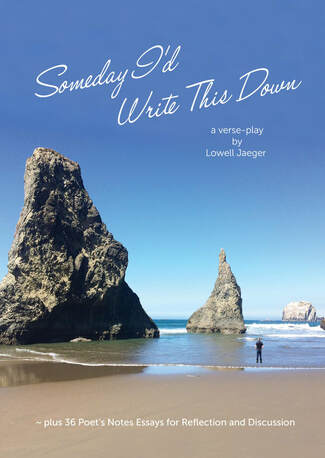
"Lowell Jaeger is a rare talent: a writer both accessible and revelatory, humane and incisive. I found this to be a beautiful read, a story about all the different manifestations of love — a story that stays with you. Someday I’d Write This Down charts the ordinary and extraordinary moments of the poet’s life, from a childhood fishing trip to the Cuban Missile Crisis to the death of an aged parent. Jaeger is at his best here — full of emotion and vigor, packed with drama and substance. This author is a joy to read, and I learn how to be more human every time I pick up one of his books."
Dr. Robert “Bob” Wilmouth — President, Rocky Mountain College
"A lover of words, Lowell Jaeger, is haunted, focused, spiritual, and generous. I am captured by the emotion of each poem, how one life can speak to the times we all have experienced. In Someday I’d Write This Down, Jaeger’s place in this world is seen through three stages of himself — boy, young man, old man. Ordinary happenings are filled with extraordinarily rich detail, opening into a flower of color just below the invisible. His emotional songs can make you cry but are also healing. Jaeger has made a life of working with words, and here he has arranged his poems into another medium of expression — a dramatic play — where we may enjoy the power of his poetry on stage."
Lois Red Elk — Lakota Elder/Actor/Poet
To purchase Someday I'd Write This Down on Amazon, please click here
Dr. Robert “Bob” Wilmouth — President, Rocky Mountain College
"A lover of words, Lowell Jaeger, is haunted, focused, spiritual, and generous. I am captured by the emotion of each poem, how one life can speak to the times we all have experienced. In Someday I’d Write This Down, Jaeger’s place in this world is seen through three stages of himself — boy, young man, old man. Ordinary happenings are filled with extraordinarily rich detail, opening into a flower of color just below the invisible. His emotional songs can make you cry but are also healing. Jaeger has made a life of working with words, and here he has arranged his poems into another medium of expression — a dramatic play — where we may enjoy the power of his poetry on stage."
Lois Red Elk — Lakota Elder/Actor/Poet
To purchase Someday I'd Write This Down on Amazon, please click here
Communion by Nahshon Cook
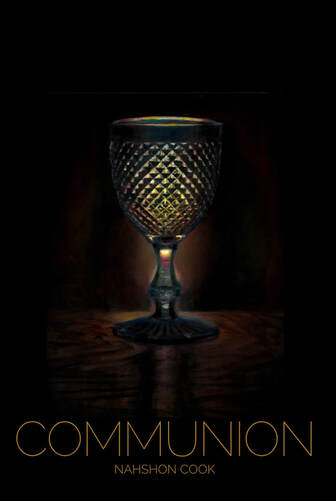
"Nashon Cook’s Communion reads like the most delicate, deepest delving into the mysteries of existence: love and sex, hate and violence, life and death in a transcendent interweaving that can leave one crying and smiling all at the same timeless time. This book evokes for me the mystical poetry of the ancient Sufi poets Rumi, Hafiz, and Lala in which body/spirit are one, where the language of sensual love becomes the language of the holy fire and mystical communion outside any church or condemnation of a man who feels passion for other men as the I-narrator does. Herein also unfolds an exploration of various kinds of love, including friendship and mother-son connection. Like the Sufi poets, Nashon Cook whirls until his words become a whirlwind of naked poetry drawing the reader’s heart into a similar ecstatic dance. Poetry doesn’t get any better than that." --Susan Deer Cloud
"In poems plainspoken and lovely, Nahshon Cook tells the human story: our need for one another and the many ways we hurt and heal, together and alone. History, joy, faith, death, revelation – Communion takes them all on with an understated grace, often through conversation, the human voice itself in relationship, in love. “by the time/I finish a poem//being alive/makes sense,” the poet tells us. That’s how I felt reading this moving collection." -- Sarah Browning, Director of Split This Rock and author of Whiskey in the Garden of Eden
"In Communion, Nahshon Cook “enters the silence of the sanctuary”, a place made wholly by body and mind, meditation and action. Observant in all meanings of that word, these poems rely on the watchful eye and response of their narrator, a black gay man in the American West, where split-second decisions have devastating impact, where a new relationship hangs in the nave of past and future. Soft-spoken and self-assured short lines and long columns are these poems’ form and hymn, a long conversation – or is it lamentation? with a congregation of sinners, sanctified, the dead and undead, dreams, and ultimately wonder, gratitude, and care." --Valerie Wallace, editor with RHINO and author of The Dictators’ Guide to Good Housekeeping
Purchase Communion on Amazon and Barnes & Noble
"In poems plainspoken and lovely, Nahshon Cook tells the human story: our need for one another and the many ways we hurt and heal, together and alone. History, joy, faith, death, revelation – Communion takes them all on with an understated grace, often through conversation, the human voice itself in relationship, in love. “by the time/I finish a poem//being alive/makes sense,” the poet tells us. That’s how I felt reading this moving collection." -- Sarah Browning, Director of Split This Rock and author of Whiskey in the Garden of Eden
"In Communion, Nahshon Cook “enters the silence of the sanctuary”, a place made wholly by body and mind, meditation and action. Observant in all meanings of that word, these poems rely on the watchful eye and response of their narrator, a black gay man in the American West, where split-second decisions have devastating impact, where a new relationship hangs in the nave of past and future. Soft-spoken and self-assured short lines and long columns are these poems’ form and hymn, a long conversation – or is it lamentation? with a congregation of sinners, sanctified, the dead and undead, dreams, and ultimately wonder, gratitude, and care." --Valerie Wallace, editor with RHINO and author of The Dictators’ Guide to Good Housekeeping
Purchase Communion on Amazon and Barnes & Noble
Johnny Appleseed: The Slice and Times of John Chapman by Jennifer Clark
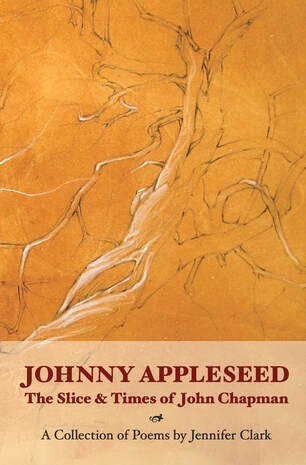
Johnny Appleseed: The Slice and Times of John Chapman
Available for purchase on Amazon and Barnes & Noble
ISBN: 978-0-9600931-6-8
Cover art by Ladislav Hanka
Nominated for a Rhysling Award and five Pushcart Prizes, Jennifer Clark’s poems, essays, and short stories have been published in numerous literary journals and anthologies. The Midwest Quarterly, Women’s Studies Quarterly, Windhover, Concho River Review, Ecotone, Nimrod, and Flyway are some of the journals that have made a home for her writings. Her short story published in Fiction Fix received their Editor’s Choice Award and her play, “Father’s Not There,” was featured at the U.S. National Conference on Child Abuse and Neglect. She lives in Kalamazoo, Michigan.
"The story is part of our American landscape: Johnny Appleseed going from field to field, town to town, planting his seeds, redeeming the misnomered forbidden fruit. Historians have recorded the life of Johnny A, real name John Chapman. But Jennifer Clark has searched the archives of the soul of this enigmatic sower of the fruit that brings tart sweetness to the mutability of autumn. In lyric poems created with that most extraordinarily difficult of approaches, the plainsong, Clark resurrects the man, his world, his benevolent eccentricity. She gives us something much more mysterious than the legend: she gives us the real. As we accompany the John Chapman we consider what it means to give without ever knowing the result. And we thank Jennifer Clark for doing the same."
--Jack Ridl, author of Practicing to Walk Like a Heron, winner of the ForeWord Reviews’ 2013 INDIEFAB Book of the Year Award
"From a couple of poems, I watched this book grow into the amazingly informed text it is now. Clark’s research is thorough, and the poems are beautiful and evocative. It’s like two books in one: a book of poetry that encompasses America’s past through the vehicle of Johnny Appleseed. As he moves through the country sowing his seeds, the American landscape, too, evolves, warts and all. The lives of pioneers and settlers, the displacement of Native Americans, slavery, the Pony Express right up to the internet. It’s such an accomplishment. And the end notes are as entertaining as the poetry. lf history had been taught like this, I would have come to it much earlier."
--Elizabeth Kerlikowske, author of Dominant Hand and the chapbook, Last Hula, winner of the 2013 Standing Rock Chapbook Competition
Purchase the Johnny Appleseed: The Slice and Times of John Chapman on Amazon and Barnes & Noble
Available for purchase on Amazon and Barnes & Noble
ISBN: 978-0-9600931-6-8
Cover art by Ladislav Hanka
Nominated for a Rhysling Award and five Pushcart Prizes, Jennifer Clark’s poems, essays, and short stories have been published in numerous literary journals and anthologies. The Midwest Quarterly, Women’s Studies Quarterly, Windhover, Concho River Review, Ecotone, Nimrod, and Flyway are some of the journals that have made a home for her writings. Her short story published in Fiction Fix received their Editor’s Choice Award and her play, “Father’s Not There,” was featured at the U.S. National Conference on Child Abuse and Neglect. She lives in Kalamazoo, Michigan.
"The story is part of our American landscape: Johnny Appleseed going from field to field, town to town, planting his seeds, redeeming the misnomered forbidden fruit. Historians have recorded the life of Johnny A, real name John Chapman. But Jennifer Clark has searched the archives of the soul of this enigmatic sower of the fruit that brings tart sweetness to the mutability of autumn. In lyric poems created with that most extraordinarily difficult of approaches, the plainsong, Clark resurrects the man, his world, his benevolent eccentricity. She gives us something much more mysterious than the legend: she gives us the real. As we accompany the John Chapman we consider what it means to give without ever knowing the result. And we thank Jennifer Clark for doing the same."
--Jack Ridl, author of Practicing to Walk Like a Heron, winner of the ForeWord Reviews’ 2013 INDIEFAB Book of the Year Award
"From a couple of poems, I watched this book grow into the amazingly informed text it is now. Clark’s research is thorough, and the poems are beautiful and evocative. It’s like two books in one: a book of poetry that encompasses America’s past through the vehicle of Johnny Appleseed. As he moves through the country sowing his seeds, the American landscape, too, evolves, warts and all. The lives of pioneers and settlers, the displacement of Native Americans, slavery, the Pony Express right up to the internet. It’s such an accomplishment. And the end notes are as entertaining as the poetry. lf history had been taught like this, I would have come to it much earlier."
--Elizabeth Kerlikowske, author of Dominant Hand and the chapbook, Last Hula, winner of the 2013 Standing Rock Chapbook Competition
Purchase the Johnny Appleseed: The Slice and Times of John Chapman on Amazon and Barnes & Noble
The Upstairs Room by Dave Buracker
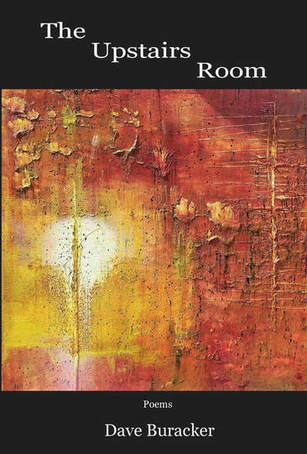
Dave Buracker is a Washington DC-area poet and visual artist. His work has appeared in over a dozen publications to include "The Amherst Review," William and Mary's "The Gallery," "Contraposition," "Vox Poetica” and the "Yellow Chair Review.” Dave’s work was recently featured in the 2017 Shabda Press anthology “Nuclear Impact: Broken Atoms in Our Hands.” In the early 1990s, Dave was a guest producer and writer for the first nationally-syndicated radio show in the United States devoted to voicing young writers, he has written comic books professionally, and he has recently exhibited his art work in Virginia. Furthermore, he has released numerous dark electronic music albums under various monikers to include Maduro and Darkened. He is currently in a dark electropop band with his wife titled Hearses Don’t Hurry. Dave lives in the Northern Virginia suburbs with wife Tracy and two dogs.
Purchase the The Upstairs Room on Amazon
or on Barnes & Noble
Purchase the The Upstairs Room on Amazon
or on Barnes & Noble
Earth-blood & Star-shine by Lowell Jaeger
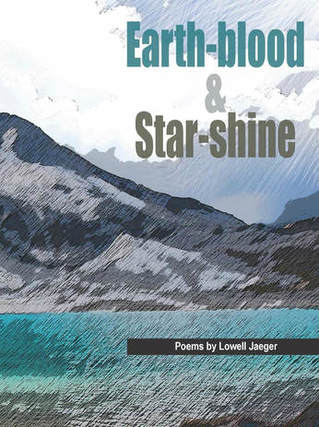
Lowell Jaeger (Montana Poet Laureate 2017-2019) is founding editor of Many Voices Press and edited New Poets of the American West, an anthology of poets from eleven western states. Jaeger is a graduate of the Iowa Writer’s Workshop, winner of the Grolier Poetry Peace Prize, and recipient of fel- lowships from the National Endowment for the Arts and the Montana Arts Council. Lowell was awarded the Montana Governor’s Humanities Award for his work in promoting civil civic discourse. He is the author of seven other collections of poems, the most recent of which is Or Maybe I Drift Off Alone (Shabda Press 2016).
Purchase Earth-blood & Star-shine on Amazon
Purchase Earth-blood & Star-shine on Amazon
Nuclear Impact: Broken Atoms in Our Hands edited by Teresa Mei Chuc
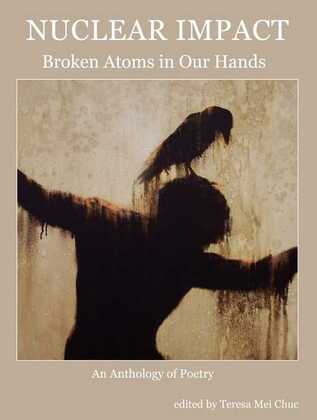
In Nuclear Impact: Broken Atoms in Our Hands is the symphonic voices of 163 poets living throughout the United States and world, in places such as India, Britain, Ireland, Canada, Philippines, Japan, South Africa, Guam, Singapore, Poland, Australia, France, Vietnam, Dubai in the United Arab Emirates, Germany, China and Pakistan, on the impact of nuclear power and warfare on human life and the planet. Navajo poet Hershman R. John's poem, "Theory of Light," opens the anthology. Towards the end of Hershman's beautiful and heart-breaking poem, he writes "The sun's core/is made from turquoise and the moon's mass is made from radiant white shell/lighting the metallic half-life in susurrations across/the Navajo-Hopi reservations." The poems in the anthology take us through Navajo-Hopi reservations, the Nevada desert, Los Alamos, Hiroshima & Nagasaki, Three Mile Island, Trinity, air raid drills, Chernobyl, Pripyat, Ogoturuk Valley, Alaska, Fukushima, nuclear testing in India and Pakistan, and more. In the poems, we experience the legacy of nuclear power created by human hands and its effects on human life and all life on Mother Earth. In the second to the last poem in the anthology, Vivian Faith Prescott, a fifth generation Alaskan of Sámi heritage, reveals nuclear impact in the tundra, the Chuckchi Sea and villages, in her brilliant and chilling poems, "Project Chariot" and "Recipe for Disaster at Ogotoruk Valley." Through the words and clarity of these poets, we see the reach of nuclear impact from the desert to the far reaches of the Artic.
Nuclear Impact: Broken Atoms in Our Hands is available on AMAZON and BARNES & NOBLE.
Nuclear Impact: Broken Atoms in Our Hands is available on AMAZON and BARNES & NOBLE.
Sunland Park: Poems by Elsa Frausto and Alice Pero
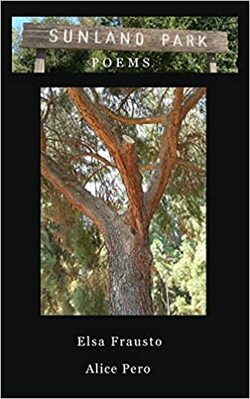
At times philosophic, at others, playful but always original and surprising, this collection makes you want to sit at the same bench with your "back[s] to the sun, face to the breeze" and meet their words in the air. Where you can "talk to the trees, /they do not care if they are famous poets/Their poems are inside their bark." Surely, Frausto and Pero's words linger there as counterpoint to the resident sparrows, the sage and great pines who watch as the world changes from day to night and season to season. --Lois P. Jones, poetry editor, Kyoto Journal.
Order on Amazon here and Barnes and Noble here
Order on Amazon here and Barnes and Noble here
Spanish Notebook by Christopher Buckley
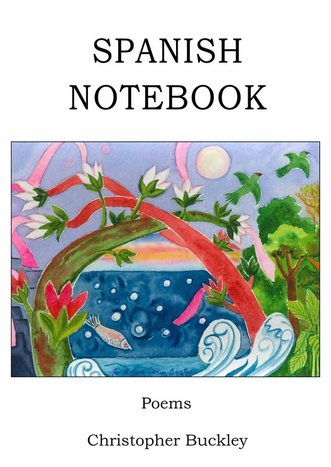
Order on Amazon or Barnes & Noble
The poems are straightforward, intensely lyrical and totally accessible. Whether he is addressing his departed friend, the poet Ernesto Trejo, or the great swell off the Pacific Ocean that haunts his dreams, the voice is always the same, modest and direct. This is a humble poetry of great truths . . . — Philip Levine, writing in Ploughshares
Christopher Buckley’s gift for wide-ranging thinking meshes so gracefully with lovingly tender details, he feels like a companion voice for all time—a Hikmet, a Neruda, yes. --Naomi Shihab Nye
Not the East Coast satirical novelist . . . this Christopher Buckley has published several poetry books and anthologies that have won him numerous accolades. . . Like Thom Gunn, Gary Snyder, and other poets whose informal style of philosophical questing complements their easy intimacy with the natural, feeling world, Buckley’s new volume deserves an honored place on the shelves of well-rounded libraries and bookstores. --F. Josephine Arrowood — FOREWORD
These are poems of immortality and extinction that can still make you smile . . . (Buckley) has an exquisite ear for language and a gutsy way of blending bravado with humility . . .. no concept is overstated—it’s all marvelously fresh. --LIBRARY JOURNAL
This is fluid, hypnotic writing, at once nostalgic and knowing . . . achieving a moody grandeur. --POETRY
The poems are straightforward, intensely lyrical and totally accessible. Whether he is addressing his departed friend, the poet Ernesto Trejo, or the great swell off the Pacific Ocean that haunts his dreams, the voice is always the same, modest and direct. This is a humble poetry of great truths . . . — Philip Levine, writing in Ploughshares
Christopher Buckley’s gift for wide-ranging thinking meshes so gracefully with lovingly tender details, he feels like a companion voice for all time—a Hikmet, a Neruda, yes. --Naomi Shihab Nye
Not the East Coast satirical novelist . . . this Christopher Buckley has published several poetry books and anthologies that have won him numerous accolades. . . Like Thom Gunn, Gary Snyder, and other poets whose informal style of philosophical questing complements their easy intimacy with the natural, feeling world, Buckley’s new volume deserves an honored place on the shelves of well-rounded libraries and bookstores. --F. Josephine Arrowood — FOREWORD
These are poems of immortality and extinction that can still make you smile . . . (Buckley) has an exquisite ear for language and a gutsy way of blending bravado with humility . . .. no concept is overstated—it’s all marvelously fresh. --LIBRARY JOURNAL
This is fluid, hypnotic writing, at once nostalgic and knowing . . . achieving a moody grandeur. --POETRY
Metamorphosis by Joan I. Siegel
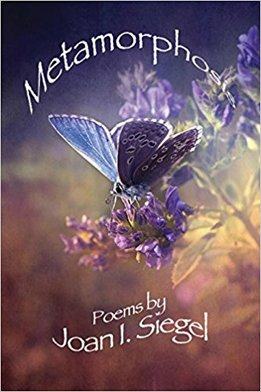
Order Metamorphosis by Joan I. Siegel on Amazon.com
"The gods and their myths have nothing on our human lives. Aging, attending failing parents, watching a child grow, a season change, a relationship falter, or the stars spin away from us--all of life is metamorphosis. With spare, delicate language and sometimes startling metaphors, Siegel takes the pulse of living creatures, even the smallest, delves inside the atom, and spins out to the galaxies. Death and loss permeate these poems and lead to somber reflection, but the poet resists despair. Against so many losses, Siegel celebrates what is found--a blue heron, music of Bach and Chopin, the child abandoned in a railway station, the gift that makes her a mother. This is a poet who can forge beauty from mortality, like the dying hummingbird, 'its wings singing / fiercely as the heart / in its splintered cage.'" --Mary Makofske, author of Traction (Ashland, 2011)
"Whatever her subject matter, Siegel beckons the reader to explore the vast world of nature and the human heart." --Ronald Spatz (Editor, Alaska Quartery Review)
Order Metamorphosis by Joan I. Siegel on Amazon.com
"The gods and their myths have nothing on our human lives. Aging, attending failing parents, watching a child grow, a season change, a relationship falter, or the stars spin away from us--all of life is metamorphosis. With spare, delicate language and sometimes startling metaphors, Siegel takes the pulse of living creatures, even the smallest, delves inside the atom, and spins out to the galaxies. Death and loss permeate these poems and lead to somber reflection, but the poet resists despair. Against so many losses, Siegel celebrates what is found--a blue heron, music of Bach and Chopin, the child abandoned in a railway station, the gift that makes her a mother. This is a poet who can forge beauty from mortality, like the dying hummingbird, 'its wings singing / fiercely as the heart / in its splintered cage.'" --Mary Makofske, author of Traction (Ashland, 2011)
"Whatever her subject matter, Siegel beckons the reader to explore the vast world of nature and the human heart." --Ronald Spatz (Editor, Alaska Quartery Review)
Or Maybe I Drift Off Alone by Lowell Jaeger
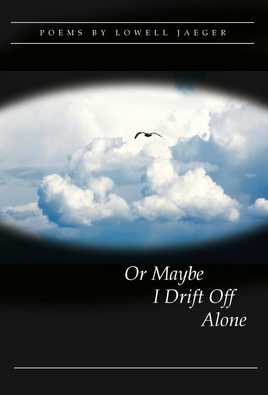
Purchase Or Maybe I Drift Off Alone on Amazon.com
Lowell Jaeger teaches creative writing at Flathead Valley Community College in Kalispell, Montana. He is author of six collections of poems: War On War (Utah State University Press, 1988), Hope Against Hope (Utah State University Press 1990), Suddenly Out of a Long Sleep (Arctos Press, 2009), WE (Main Street Rag Publishing, 2010), How Quickly What's Passing Goes Past (Grayson Books, 2013) and Driving the Back Road Home (Shabda Press, 2015). He is founding editor of Many Voices Press and recently edited New Poets of the American West, an anthology of poets from western states. He is a graduate of the Iowa Writer’s Workshop, winner of the Grolier Poetry Peace Prize, and recipient of fellowships from the National Endowment for the Arts and the Montana Arts Council. In 2010, Jaeger was awarded the Montana Governor’s Humanities Award for his work in promoting civil civic discourse.
“The title for Lowell Jaeger’s Or Maybe I Drift Off Alone comes from his poem, “Four Chaplains,” a story of self-sacrifice in a hopeless situation. These poems puzzle over themes of duty and sacrifice within the give and take of ordinary lives. Those who tell the tales are sometimes generous and sometimes not, but they are unwaveringly honest. “Let’s assume there’s a lesson/ in every small thing,” Jaeger writers in “Follow Your Bliss?” This is a book of small things and lessons made eloquent by Jaeger’s formal and lyrical skill. County library book sales, small town restaurants, road trips, and tow trucks all have a place in this volume whose ultimate theme is acceptance, forgiveness, and love.” --Tami Haaland, former Montana Poet Laureate and author of When We Wake in the Night
“Like William Carlos Williams, William Stafford, and Dorianne Laux, Lowell Jaeger is a poet of commonplace things that matter, the rhythms and cast-off minutes that animate our days and lives. Jaeger writes with wit, wonder, and stark, tender honesty. His language is precise but never pretentious, his narratives full, profound, surprising. In the penultimate poem, we are stopped along a “backroad meadow,” where two horses approach, “as if to ask what news [we] might bring.” Well, let me tell you now the news you’ll find herein is full and true; it is “despite our separate hardships” nothing more, and nothing less, than “the goodness of this day.” —Joe Wilkins, author of The Mountain and the Fathers and When We Were Birds
Lowell Jaeger teaches creative writing at Flathead Valley Community College in Kalispell, Montana. He is author of six collections of poems: War On War (Utah State University Press, 1988), Hope Against Hope (Utah State University Press 1990), Suddenly Out of a Long Sleep (Arctos Press, 2009), WE (Main Street Rag Publishing, 2010), How Quickly What's Passing Goes Past (Grayson Books, 2013) and Driving the Back Road Home (Shabda Press, 2015). He is founding editor of Many Voices Press and recently edited New Poets of the American West, an anthology of poets from western states. He is a graduate of the Iowa Writer’s Workshop, winner of the Grolier Poetry Peace Prize, and recipient of fellowships from the National Endowment for the Arts and the Montana Arts Council. In 2010, Jaeger was awarded the Montana Governor’s Humanities Award for his work in promoting civil civic discourse.
“The title for Lowell Jaeger’s Or Maybe I Drift Off Alone comes from his poem, “Four Chaplains,” a story of self-sacrifice in a hopeless situation. These poems puzzle over themes of duty and sacrifice within the give and take of ordinary lives. Those who tell the tales are sometimes generous and sometimes not, but they are unwaveringly honest. “Let’s assume there’s a lesson/ in every small thing,” Jaeger writers in “Follow Your Bliss?” This is a book of small things and lessons made eloquent by Jaeger’s formal and lyrical skill. County library book sales, small town restaurants, road trips, and tow trucks all have a place in this volume whose ultimate theme is acceptance, forgiveness, and love.” --Tami Haaland, former Montana Poet Laureate and author of When We Wake in the Night
“Like William Carlos Williams, William Stafford, and Dorianne Laux, Lowell Jaeger is a poet of commonplace things that matter, the rhythms and cast-off minutes that animate our days and lives. Jaeger writes with wit, wonder, and stark, tender honesty. His language is precise but never pretentious, his narratives full, profound, surprising. In the penultimate poem, we are stopped along a “backroad meadow,” where two horses approach, “as if to ask what news [we] might bring.” Well, let me tell you now the news you’ll find herein is full and true; it is “despite our separate hardships” nothing more, and nothing less, than “the goodness of this day.” —Joe Wilkins, author of The Mountain and the Fathers and When We Were Birds
highway of sleeping towns by Deborah P Kolodji
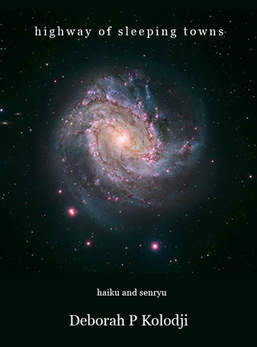
Deborah P Kolodji moderates the Southern California Haiku Study Group and is the California Regional Coordinator for the Haiku Society of America. Former president of the Science Fiction Poetry Association, she has a degree in mathematics from the University of Southern California and was recently named to the Board of Directors of Haiku North America. With over 900 published poems to her name, and four chapbooks of poetry, Seaside Moon (2005), Red Planet Dust (2006), unfinished book (2006), andSymphony of the Universe (2006), she finds inspiration in the beaches, mountains, deserts, and urban life of LA County.
Order highway of sleeping towns on Amazon or on Barnes & Noble
"Deborah P Kolodji’s haiku collection is a gem. Born of an art that transcends science, her haiku transport the reader into the past and future, while being firmly rooted in the present. Highway of Sleeping Towns underlines the truth that the the best haiku are contemporary and ageless, personal and universal.
- Roberta Beary, author of the Unworn Necklace and editor at Modern Haiku
“The publication of a highway of sleeping towns by Deborah P Kolodji is cause for celebration. This book is a selection of this poet's strongest work all under one roof! Kolodji writes about the ordinary, as any good haiku poet should, but the difference here is the wide spectrum that she covers which simply captivates us all. Her haiku and senryu are so clean and clear that it allows the reader to see and experience the many aspects of our daily world in ways we never have before. What else could we ask for? Simply one of the best haiku books out there. It's worth its weight in ink!”
- Stanford M. Forrester, editor of bottle rockets and past president of the Haiku Society of America
“Whether Deborah P Kolodji is examining black-bellied plovers, last persimmons, sea bass in reduction sauce, or oxygen tubes stretched the length of the house, her haiku reveal a depth and lightness that mark fine writing; her highway of sleeping towns creates a constellation of stellar images. Kolodji is one of the best haiku poets in America today; she is relentless in her search for self-truth: one mistake/after another…/ falling leaves; or, sometimes/ there’s nothing left/ dried apricots. I rest my case.”
- Terry Ann Carter, President, Haiku Canada
"In this first full collection of haiku, Deborah P. Kolodji’s observations are deep and prismatic, allowing us entry into her universe of analytic piquancy, wit, and pathos. This condensery of encounters takes the reader from micro to macro, making good on its bold title and cover, suggesting that a highway of sleeping towns may not be relegated to earth but that the cosmos is populated by beings much like us who look to their lives and loves, to nature and to the night sky for a chance at communion. These works build a repertoire of wonder – pulsing sea jellies/a symphony orchestra/on mute offering the reader not only pause but continual playback. Whoever you are, these poems will move you to bare witness to the power of this diminutive form to shape meaning from moment and the ways in which a masterful poet makes any moment profound."
-Lois P. Jones, Poetry Editor, Kyoto Journal
Order highway of sleeping towns on Amazon or on Barnes & Noble
"Deborah P Kolodji’s haiku collection is a gem. Born of an art that transcends science, her haiku transport the reader into the past and future, while being firmly rooted in the present. Highway of Sleeping Towns underlines the truth that the the best haiku are contemporary and ageless, personal and universal.
- Roberta Beary, author of the Unworn Necklace and editor at Modern Haiku
“The publication of a highway of sleeping towns by Deborah P Kolodji is cause for celebration. This book is a selection of this poet's strongest work all under one roof! Kolodji writes about the ordinary, as any good haiku poet should, but the difference here is the wide spectrum that she covers which simply captivates us all. Her haiku and senryu are so clean and clear that it allows the reader to see and experience the many aspects of our daily world in ways we never have before. What else could we ask for? Simply one of the best haiku books out there. It's worth its weight in ink!”
- Stanford M. Forrester, editor of bottle rockets and past president of the Haiku Society of America
“Whether Deborah P Kolodji is examining black-bellied plovers, last persimmons, sea bass in reduction sauce, or oxygen tubes stretched the length of the house, her haiku reveal a depth and lightness that mark fine writing; her highway of sleeping towns creates a constellation of stellar images. Kolodji is one of the best haiku poets in America today; she is relentless in her search for self-truth: one mistake/after another…/ falling leaves; or, sometimes/ there’s nothing left/ dried apricots. I rest my case.”
- Terry Ann Carter, President, Haiku Canada
"In this first full collection of haiku, Deborah P. Kolodji’s observations are deep and prismatic, allowing us entry into her universe of analytic piquancy, wit, and pathos. This condensery of encounters takes the reader from micro to macro, making good on its bold title and cover, suggesting that a highway of sleeping towns may not be relegated to earth but that the cosmos is populated by beings much like us who look to their lives and loves, to nature and to the night sky for a chance at communion. These works build a repertoire of wonder – pulsing sea jellies/a symphony orchestra/on mute offering the reader not only pause but continual playback. Whoever you are, these poems will move you to bare witness to the power of this diminutive form to shape meaning from moment and the ways in which a masterful poet makes any moment profound."
-Lois P. Jones, Poetry Editor, Kyoto Journal
Before Language by Susan Deer Cloud
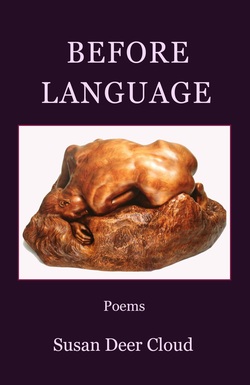
Order Before Language on Amazon or Barnes & Noble
Susan Deer Cloud, a mixed lineage Catskill Indian, is an alumna of Goddard College (MFA) and Binghamton University (B.A. and M.A.). She has taught Creative Writing, Rhetoric and Literature at Binghamton University and Broome Community College. A few years ago she returned to her “heart country” Catskills to dwell once more with foxes, deer, black bears, bald eagles, and the ghosts of panthers and ancestors. She now lives as a full-time mountain woman, dreamer and writer.
Deer Cloud is the recipient of various awards and fellowships, including an Elizabeth George Foundation Grant, a National Endowment for the Arts Literature Fellowship, two New York State Foundation for the Arts Fellowships, and a Chenango County Council for the Arts Individual Artist’s Grant. Some of her books are Hunger Moon (Shabda Press); Fox Mountain, The Last Ceremony and Car Stealer (FootHills Publishing); and Braiding Starlight (Split Oak Press). Her poems, stories and essays have been published in anthologies and journals too numerous to name.
In order to get out “the voices of the voiceless,” the poet has edited three published anthologies: multicultural Confluence and Native American anthologies I Was Indian (Before Being Indian Was Cool), Volumes I & II; the 2008 Spring Issue of Yellow Medicine Review, a Journal of Indigenous Literature, Art & Thought; and the Re-Matriation Chapbook Series of Indigenous Poetry. She is a member of the international peace organization SERVAS; Poets & Writers; Associated Writing Programs (AWP); and indigenous Wordcraft Circle. She has served on panels at writers’ conferences and given myriad poetry readings at colleges, cultural centers, coffee houses, and other venues.
In between her sojourns in the Catskills, Deer Cloud has spent the past few years roving with her life’s companion, John Gunther, around Turtle Island (North America) as well as on the Isles (Iceland, Ireland, Scotland, Wales and England) and Europe. She has been not only on a physical journey but a spiritual quest for her deepest roots tied in with ancestresses, ancient truths, and the sacred web of life. One magical part of this journey was meeting Beat Stähli, the cover artist for Before Language, who she has come to consider both a mountain brother and kindred spirit. She a daughter of the Catskill Mountains, he the son of the Swiss Alps, she views their creative collaboration as a friendship dreaming the two halves of the world together into a wholeness embodying peace and love.
Susan Deer Cloud, a mixed lineage Catskill Indian, is an alumna of Goddard College (MFA) and Binghamton University (B.A. and M.A.). She has taught Creative Writing, Rhetoric and Literature at Binghamton University and Broome Community College. A few years ago she returned to her “heart country” Catskills to dwell once more with foxes, deer, black bears, bald eagles, and the ghosts of panthers and ancestors. She now lives as a full-time mountain woman, dreamer and writer.
Deer Cloud is the recipient of various awards and fellowships, including an Elizabeth George Foundation Grant, a National Endowment for the Arts Literature Fellowship, two New York State Foundation for the Arts Fellowships, and a Chenango County Council for the Arts Individual Artist’s Grant. Some of her books are Hunger Moon (Shabda Press); Fox Mountain, The Last Ceremony and Car Stealer (FootHills Publishing); and Braiding Starlight (Split Oak Press). Her poems, stories and essays have been published in anthologies and journals too numerous to name.
In order to get out “the voices of the voiceless,” the poet has edited three published anthologies: multicultural Confluence and Native American anthologies I Was Indian (Before Being Indian Was Cool), Volumes I & II; the 2008 Spring Issue of Yellow Medicine Review, a Journal of Indigenous Literature, Art & Thought; and the Re-Matriation Chapbook Series of Indigenous Poetry. She is a member of the international peace organization SERVAS; Poets & Writers; Associated Writing Programs (AWP); and indigenous Wordcraft Circle. She has served on panels at writers’ conferences and given myriad poetry readings at colleges, cultural centers, coffee houses, and other venues.
In between her sojourns in the Catskills, Deer Cloud has spent the past few years roving with her life’s companion, John Gunther, around Turtle Island (North America) as well as on the Isles (Iceland, Ireland, Scotland, Wales and England) and Europe. She has been not only on a physical journey but a spiritual quest for her deepest roots tied in with ancestresses, ancient truths, and the sacred web of life. One magical part of this journey was meeting Beat Stähli, the cover artist for Before Language, who she has come to consider both a mountain brother and kindred spirit. She a daughter of the Catskill Mountains, he the son of the Swiss Alps, she views their creative collaboration as a friendship dreaming the two halves of the world together into a wholeness embodying peace and love.
Indigo : Tanka Poetry by Mariko Kitakubo
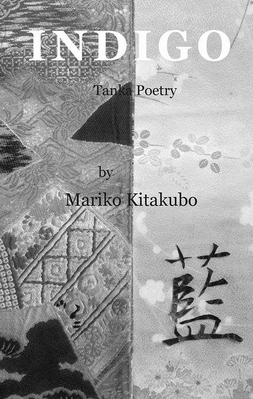
Mariko Kitakubo has published five books of tanka including two bilingual ones, On This Same Star and Cicada Forest. She has also produced a CD of her tanka titled "Messages."
Mariko is an experienced performer who has presented her poetry on at least 130 occasions, 80 of them overseas (Nov. 2015). She hopes to encourage more poetry lovers worldwide to appreciate and practice tanka.
Please click here to purchase the book on Amazon or Barnes & Noble.
“The Japanese, for over a thousand years, have composed the tanka and considered it their most important form of poetry. In the nineteenth century, the spread of European poetry induced many Japanese poets to doubt that a poem in only thirty-one syllables could be anything more than the record of a momentary sensation. Ishikawa Takuboku, though famous as a rebel poet, answered the doubters, “Although a tanka may last only a second, it is a second that will not return again, no matter how long one lives. I believe that such moments are to be cherished, I do not wish to let them escape.” He added somewhat cynically, “One of the few blessings that we Japanese enjoy is having the tanka.”
Takuboku retained the traditional thirty-one syllables of the tanka but divided them into three lines, instead of the traditional single line, giving the form greater dramatic possibilities.
The poems of Mariko Kitakubo, both in Japanese and in English, contain a combination of the thousand year old and the most modern. Her Japanese poems have the traditional number of syllables and the English poems are divided into five lines as in tanka :
ga no kage no/ fui ni ookiku/ nari yukeri/
aragai gataki/ houyou no nochi
suddenly
the shadow of a moth
growing larger--
after an embrace
difficult to resist
The Japanese poems are in ancient, not modern speech. But the division of the poems into two sections in the Japanese and five in English makes the poems seem strikingly modern. Mention of a moth, an insect appealing to English poets but shunned by Japanese poets, may seem to separate the two worlds, but the embrace brings them together.”
--Donald Keene
“Mariko KItakubo's sixth book of tanka is a masterpiece of disquiet and profound yearning. It's poetry speaks to the human condition in an era that has just begun to understand, and attempt to divert and remedy, a ruination that evidence shows mankind itself has inflicted on the planet. Indigo leaves us gazing with longing upon our own disappearance into the existential drifts of time and materiality.
Kitakubo writes, "my motherland / will be a coffin / of the stormy wind" and points to "the light rain / of radiation" to show us how "history is settling / in the bottom of the river." She sees herself as "an infinitesimal / splash in the dust" and outlines in images of stark finality a vision of sunflower seeds and a people-less planet "after the dream / of civilization." Here is poetry that steps with courage and passion into the forum of ideas and the enormous issues of our day. Kitakubo's mastery of the ancient tanka form gives to her testament in Indigo the perspectives of personalized history and the high art of a compelling literary tradition.
My congratulations go to Shabda Press for publishing this first edition of a work so worthy of universal value and wide readership. May the voice within us all find equal resource, principle, and kinship.”
--Michael McClintock, President, Tanka Society of America (2005-2011) and author of "The Tanka Café" in Ribbons: Tanka Society of America Journal.
"From floating lanterns at Hiroshima to the unstoppable petal storm of cherry blossoms, Mariko Kitakubo’s vivid imagery tugs at the full range of our emotions—from the horror of war to the joy of a new love, from redwood forests to dreams of Betelgeuse, Indigo is a highly recommended journey you will never forget."
--Deborah P. Kolodji, California Regional Coordinator, Haiku Society of America
Mariko is an experienced performer who has presented her poetry on at least 130 occasions, 80 of them overseas (Nov. 2015). She hopes to encourage more poetry lovers worldwide to appreciate and practice tanka.
Please click here to purchase the book on Amazon or Barnes & Noble.
“The Japanese, for over a thousand years, have composed the tanka and considered it their most important form of poetry. In the nineteenth century, the spread of European poetry induced many Japanese poets to doubt that a poem in only thirty-one syllables could be anything more than the record of a momentary sensation. Ishikawa Takuboku, though famous as a rebel poet, answered the doubters, “Although a tanka may last only a second, it is a second that will not return again, no matter how long one lives. I believe that such moments are to be cherished, I do not wish to let them escape.” He added somewhat cynically, “One of the few blessings that we Japanese enjoy is having the tanka.”
Takuboku retained the traditional thirty-one syllables of the tanka but divided them into three lines, instead of the traditional single line, giving the form greater dramatic possibilities.
The poems of Mariko Kitakubo, both in Japanese and in English, contain a combination of the thousand year old and the most modern. Her Japanese poems have the traditional number of syllables and the English poems are divided into five lines as in tanka :
ga no kage no/ fui ni ookiku/ nari yukeri/
aragai gataki/ houyou no nochi
suddenly
the shadow of a moth
growing larger--
after an embrace
difficult to resist
The Japanese poems are in ancient, not modern speech. But the division of the poems into two sections in the Japanese and five in English makes the poems seem strikingly modern. Mention of a moth, an insect appealing to English poets but shunned by Japanese poets, may seem to separate the two worlds, but the embrace brings them together.”
--Donald Keene
“Mariko KItakubo's sixth book of tanka is a masterpiece of disquiet and profound yearning. It's poetry speaks to the human condition in an era that has just begun to understand, and attempt to divert and remedy, a ruination that evidence shows mankind itself has inflicted on the planet. Indigo leaves us gazing with longing upon our own disappearance into the existential drifts of time and materiality.
Kitakubo writes, "my motherland / will be a coffin / of the stormy wind" and points to "the light rain / of radiation" to show us how "history is settling / in the bottom of the river." She sees herself as "an infinitesimal / splash in the dust" and outlines in images of stark finality a vision of sunflower seeds and a people-less planet "after the dream / of civilization." Here is poetry that steps with courage and passion into the forum of ideas and the enormous issues of our day. Kitakubo's mastery of the ancient tanka form gives to her testament in Indigo the perspectives of personalized history and the high art of a compelling literary tradition.
My congratulations go to Shabda Press for publishing this first edition of a work so worthy of universal value and wide readership. May the voice within us all find equal resource, principle, and kinship.”
--Michael McClintock, President, Tanka Society of America (2005-2011) and author of "The Tanka Café" in Ribbons: Tanka Society of America Journal.
"From floating lanterns at Hiroshima to the unstoppable petal storm of cherry blossoms, Mariko Kitakubo’s vivid imagery tugs at the full range of our emotions—from the horror of war to the joy of a new love, from redwood forests to dreams of Betelgeuse, Indigo is a highly recommended journey you will never forget."
--Deborah P. Kolodji, California Regional Coordinator, Haiku Society of America
I Still Remember the Last Time You Held My Hand by David Giver
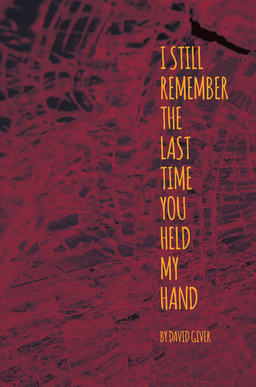
David Giver is the author of A Slow Education (Shabda Press, 2013) and How to Commit Suicide (Unthinkable Creatures, 2013). He is on the staff of the Southern Poetry Review, and he teaches at Armstrong State University.
Please click here to purchase the book on Amazon or Barnes & Noble
What happens when a man/father/husband flails between denial, anger, bargaining, and depression, but never reaches acceptance? What happens when a grief is too great? David Giver’s, I Can Still Remember the Last Time You Held My Hand explores the unknowable grief that comes with the death of a child. The form of the book--its enjambment, flashback, and realism—mirrors the experience of anguish itself. Giver guides us through this foggy grief with his brave, honest words and difficult truths. ~ Kristen Nelson, author of Write, Dad
"A dark, hypnotic meditation on a young man's grief and alienation following a child's death, I Can Still Remember the Last Time You Held My Hand is truly mesmerizing. Each line in this sustained lyric poem beats like blood through a broken heart." ~ Maggie Cleveland, author of Atom Fish
David Giver's wry take on modern family life, lovelessness, and untimely death is understated, by turns ironic and funny, but ultimately devastating. The father is an anti-hero like Willy Loman or Kevin Spacey's Lester Bernham in American Beauty: cynical and detached from his middle class American life. The strength of Giver's writing lies in his deft movements between sentimentality, deadpan humor, and horror. I Can Still Remember the Last Time You Held My Hand is a strange and evocative little book. ~ Kristen Stone, author of Domestication Handbook
Please click here to purchase the book on Amazon or Barnes & Noble
What happens when a man/father/husband flails between denial, anger, bargaining, and depression, but never reaches acceptance? What happens when a grief is too great? David Giver’s, I Can Still Remember the Last Time You Held My Hand explores the unknowable grief that comes with the death of a child. The form of the book--its enjambment, flashback, and realism—mirrors the experience of anguish itself. Giver guides us through this foggy grief with his brave, honest words and difficult truths. ~ Kristen Nelson, author of Write, Dad
"A dark, hypnotic meditation on a young man's grief and alienation following a child's death, I Can Still Remember the Last Time You Held My Hand is truly mesmerizing. Each line in this sustained lyric poem beats like blood through a broken heart." ~ Maggie Cleveland, author of Atom Fish
David Giver's wry take on modern family life, lovelessness, and untimely death is understated, by turns ironic and funny, but ultimately devastating. The father is an anti-hero like Willy Loman or Kevin Spacey's Lester Bernham in American Beauty: cynical and detached from his middle class American life. The strength of Giver's writing lies in his deft movements between sentimentality, deadpan humor, and horror. I Can Still Remember the Last Time You Held My Hand is a strange and evocative little book. ~ Kristen Stone, author of Domestication Handbook
The Fourth River by Joan I. Siegel

Author of Hyacinth for the Soul (Deerbrook Editions, 2009), A Passing (Deerbrook Editions, 2014), Light at Point Reyes (Shabda Press, 2012) as well as co-author of Peach Girl: Poems for a Chinese Daughter (Grayson Books 2002), Joan I. Siegel is recipient of Poetry Quarterly's Rebecca Lard Award, New Letters Poetry Award and the Anna Davidson Rosenberg Prize. A finalist for the Pablo Neruda Prize, she has published widely in journals and anthologies. Siegel lives in the lower Hudson Valley of New York State. Emerita Professor of English at SUNY/Orange, she volunteers at a local no-kill animal shelter, tends to 10 rescued cats, plants a summer garden and watches it grow.
Cover art by Jack Heller
Purchase the book on Amazon or Barnes and Noble
“Whatever her subject matter Joan Siegel, like the best of poets, admits us into her passionately contained vision of the world. In The Fourth River she explores origins and returns with beautiful simplicity.” —Diane Wakoski
“The touching poems in Joan Siegel’s The Fourth River are moments of life and loss in which “even the wind catches fire.” Reflecting the fragility of memory and of time itself, they flow with inexorable capacity of the heart’s meanders and gravity.” —Ronald Spatz, Editor, Alaska Quarterly Review
"Time is palpable in Joan Siegel’s book The Fourth River; it moves and flows through each poem, taking the reader forward and backward in chronology, imagining an existence in which the speaker’s father can be both boy and man simultaneously. This book is a collection of time: anniversaries—first twenty then thirty—and birthdays and units of measure. In “This Birthday” time is both solid and malleable: “You rooted first/then traveled alone/the treacherous journey,/making way for me later.” Perhaps the best definition of time can be found in the poet’s own words: “Time ends in the gold/throat of lily sipping/a last drought of sun.” In Siegel’s work, time is a golden atmosphere—tactile, pulsing, and flowing liquid as rivers." --Andrea Spofford, Editor, Zone 3 Press
Cover art by Jack Heller
Purchase the book on Amazon or Barnes and Noble
“Whatever her subject matter Joan Siegel, like the best of poets, admits us into her passionately contained vision of the world. In The Fourth River she explores origins and returns with beautiful simplicity.” —Diane Wakoski
“The touching poems in Joan Siegel’s The Fourth River are moments of life and loss in which “even the wind catches fire.” Reflecting the fragility of memory and of time itself, they flow with inexorable capacity of the heart’s meanders and gravity.” —Ronald Spatz, Editor, Alaska Quarterly Review
"Time is palpable in Joan Siegel’s book The Fourth River; it moves and flows through each poem, taking the reader forward and backward in chronology, imagining an existence in which the speaker’s father can be both boy and man simultaneously. This book is a collection of time: anniversaries—first twenty then thirty—and birthdays and units of measure. In “This Birthday” time is both solid and malleable: “You rooted first/then traveled alone/the treacherous journey,/making way for me later.” Perhaps the best definition of time can be found in the poet’s own words: “Time ends in the gold/throat of lily sipping/a last drought of sun.” In Siegel’s work, time is a golden atmosphere—tactile, pulsing, and flowing liquid as rivers." --Andrea Spofford, Editor, Zone 3 Press
Driving the Back Road Home by Lowell Jaeger

Lowell Jaeger teaches creative writing at Flathead Valley Community College in Kalispell, Montana. He is author of six collections of poems: War On War (Utah State University Press, 1988), Hope Against Hope (Utah State University Press 1990), Suddenly Out of a Long Sleep (Arctos Press, 2009), WE (Main Street Rag Publishing, 2010), How Quickly What's Passing Goes Past (Grayson Books, 2013) and Driving the Back Road Home (Shabda Press, 2015). He is founding editor of Many Voices Press and recently edited New Poets of the American West, an anthology of poets from western states. He is a graduate of the Iowa Writer’s Workshop, winner of the Grolier Poetry Peace Prize, and recipient of fellowships from the National Endowment for the Arts and the Montana Arts Council. Most recently, Lowell was awarded the Montana Governor’s Humanities Award for his work in promoting civil civic discourse.
Purchase the book on Amazon
Lowell Jaeger does justice to the images, sounds, and memories of the everyday. The past and the present are recorded with his masterful, but subtle, use of language that accurately captures the magic inherent in every living moment; the holding of a girl’s hand in the eighth grade, the impromptu observation of a job-related performance evaluation, or a student running into his professor on the same day he ditched his class. Jaeger’s interactions in this world are interwoven with the mundane and the mystical, and his poems remind us of the beauty and wonder that awaits us when we pay attention. —Richard Vargas, poet, author of Guernica, revisted and editor/publisher of The Más Tequila Review
For many years now I have enjoyed and admired the poetry of Lowell Jaeger. It reminds us gently, but with a moral and humane undercurrent, to put by “all this/important nonsense” and appreciate the small details of our lives, to see them transformed as he does. Lowell Jaeger writes with a craft, clarity, and subtle intensity that has “my battered earth/singing in tongues.” —Christopher Buckley
The poems in Driving the Back Road Home by Lowell Jaeger, in their gentleness and simplicity, awaken us to ourselves and to each other, grounding us in our shared humanity and shared imperfections. They remind us that the natural world of plants and animals, rivers and oceans are also listening to and watching us in our shared earth home. In Jaeger’s poem, “listening,” the speaker is holding a pebble he found in his shoe and is “listening/ to the winds pummeling the dunes/ and the relentless ocean grinding.” After reading Jaeger’s book, when I open my eyes, I see the world with more compassion, and I also see my place in the world transformed. As in his poem, “even the loam breathes,” Jaeger’s poetry is an offering…”a morsel of his bloody flesh” that “strengthens the wings of a fledgling/ straining to fly.” — Teresa Mei Chuc
Purchase the book on Amazon
Lowell Jaeger does justice to the images, sounds, and memories of the everyday. The past and the present are recorded with his masterful, but subtle, use of language that accurately captures the magic inherent in every living moment; the holding of a girl’s hand in the eighth grade, the impromptu observation of a job-related performance evaluation, or a student running into his professor on the same day he ditched his class. Jaeger’s interactions in this world are interwoven with the mundane and the mystical, and his poems remind us of the beauty and wonder that awaits us when we pay attention. —Richard Vargas, poet, author of Guernica, revisted and editor/publisher of The Más Tequila Review
For many years now I have enjoyed and admired the poetry of Lowell Jaeger. It reminds us gently, but with a moral and humane undercurrent, to put by “all this/important nonsense” and appreciate the small details of our lives, to see them transformed as he does. Lowell Jaeger writes with a craft, clarity, and subtle intensity that has “my battered earth/singing in tongues.” —Christopher Buckley
The poems in Driving the Back Road Home by Lowell Jaeger, in their gentleness and simplicity, awaken us to ourselves and to each other, grounding us in our shared humanity and shared imperfections. They remind us that the natural world of plants and animals, rivers and oceans are also listening to and watching us in our shared earth home. In Jaeger’s poem, “listening,” the speaker is holding a pebble he found in his shoe and is “listening/ to the winds pummeling the dunes/ and the relentless ocean grinding.” After reading Jaeger’s book, when I open my eyes, I see the world with more compassion, and I also see my place in the world transformed. As in his poem, “even the loam breathes,” Jaeger’s poetry is an offering…”a morsel of his bloody flesh” that “strengthens the wings of a fledgling/ straining to fly.” — Teresa Mei Chuc
The Killing Fields and Other Poems by Nahshon Cook
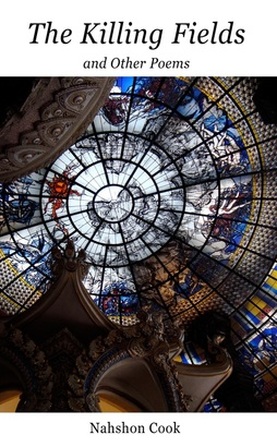
Nahshon Cook’s poems have appeared in literary publications including Spiritual Directors International, The Houston Literary Review, Post Poetry Magazine, Epic Rites Journal, the Origami Poetry Project, Euonia Review, and the Salmon Poetry Anthology Dog’s Singing. His first collection of poetry A New Beginning was published in January 2010 by Paper Flower Press and was nominated for the 2011 Colorado Book Award. He has poems forthcoming in Presipolis Magazine, A&U, and the Desperanto Press Anthology: Bound By Secrets 2.
Order The Killing Fields and Other Poems by Nahshon Cook on Amazon or Barnes & Noble
"Nahshon Cook’s The Killing Fields is a magnificent map of poems. These powerful and quiet poems lead us on a poetic journey through Cambodia, China, Nepal, Thailand, and America. They also beckon us toward an interior human journey. We meet lepers and angels, dancers and lovers, monks and mothers. These intricately crafted poems are both the road and the signposts. They map a way of compassion that observes and hopes. On the nights you can’t pray, just take out this book. These poems will point you in the right direction."
-- Joseph Ross, author of Gospel of Dust and Meeting Bone Man
"Nahshon Cook's poetry is heart wrenching but beautiful. To read his words is to be lifted from your luxuries and comforts by the talons of a hawk and dropped into a valley full of mirrors where you must face your own humanity and absence of it each time you turn around."
-- Jason Hardung, author of The Names of Lost Things and The Broken and the Damned
Order The Killing Fields and Other Poems by Nahshon Cook on Amazon or Barnes & Noble
"Nahshon Cook’s The Killing Fields is a magnificent map of poems. These powerful and quiet poems lead us on a poetic journey through Cambodia, China, Nepal, Thailand, and America. They also beckon us toward an interior human journey. We meet lepers and angels, dancers and lovers, monks and mothers. These intricately crafted poems are both the road and the signposts. They map a way of compassion that observes and hopes. On the nights you can’t pray, just take out this book. These poems will point you in the right direction."
-- Joseph Ross, author of Gospel of Dust and Meeting Bone Man
"Nahshon Cook's poetry is heart wrenching but beautiful. To read his words is to be lifted from your luxuries and comforts by the talons of a hawk and dropped into a valley full of mirrors where you must face your own humanity and absence of it each time you turn around."
-- Jason Hardung, author of The Names of Lost Things and The Broken and the Damned
Indefinite Detention: A Dog Story by Michael Rothenberg
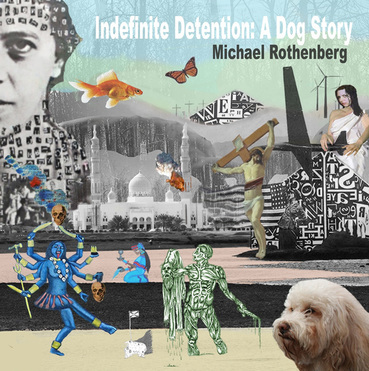
Michael Rothenberg is a poet, songwriter, editor and publisher of the online literary magazine Big Bridge, www.bigbridge.org and co-founder of the global poetry movement 100 Thousand Poets for Change, www.100tpc.org.
Born in Miami Beach, Florida in 1951, Rothenberg moved to the San Francisco Bay Area in 1975 and co-founded Shelldance Orchid Gardens in Pacifica, which is dedicated to the cultivation of orchids and bromeliads. While in Pacifica, he helped lead local environmental actions that stopped major coastal developments that would destroy wildlife habitat.
His poems have been widely published in literary reviews such as Exquisite Corpse, Mudlark, Golden Handcuffs Review, Jacket, OR, Prague Literary Review, Sycamore Review, Tricycle, and Zyzzyva.
His books of poetry include Favorite Songs (Big Bridge Press), Man/Women with Joanne Kyger (Big Bridge Press), The Paris Journals (Fish Drum Press), Monk Daddy (Blue Press), Unhurried Vision (La Alameda/University of New Mexico Press), Choose (Big Bridge Press), My Youth As A Train (Foothills Publishing), Murder (Paper Press Books), and he is the author of the eco-spy thrillerPunk Rockwell (Tropical Press).
Michael Rothenberg is also editor of several volumes in the Penguin Poets series: Overtime by Philip Whalen, As Ever by Joanne Kyger, David’s Copy by David Meltzer, and Way More West by Ed Dorn. He is also editor of The Collected Poems of Philip Whalen published by Wesleyan University Press.
Indefinite Detention: A Dog Story is scheduled for publication in 2014 by both Shabda Press (USA) and Al Kotob Khan (Cairo, Egypt) in an Arab edition, translated by El Habib Louai.
Purchase Indefinite Detention: A Dog Story by Michael Rothenberg on Amazon or Barnes and Noble
Cover design by Terri Carrion
Born in Miami Beach, Florida in 1951, Rothenberg moved to the San Francisco Bay Area in 1975 and co-founded Shelldance Orchid Gardens in Pacifica, which is dedicated to the cultivation of orchids and bromeliads. While in Pacifica, he helped lead local environmental actions that stopped major coastal developments that would destroy wildlife habitat.
His poems have been widely published in literary reviews such as Exquisite Corpse, Mudlark, Golden Handcuffs Review, Jacket, OR, Prague Literary Review, Sycamore Review, Tricycle, and Zyzzyva.
His books of poetry include Favorite Songs (Big Bridge Press), Man/Women with Joanne Kyger (Big Bridge Press), The Paris Journals (Fish Drum Press), Monk Daddy (Blue Press), Unhurried Vision (La Alameda/University of New Mexico Press), Choose (Big Bridge Press), My Youth As A Train (Foothills Publishing), Murder (Paper Press Books), and he is the author of the eco-spy thrillerPunk Rockwell (Tropical Press).
Michael Rothenberg is also editor of several volumes in the Penguin Poets series: Overtime by Philip Whalen, As Ever by Joanne Kyger, David’s Copy by David Meltzer, and Way More West by Ed Dorn. He is also editor of The Collected Poems of Philip Whalen published by Wesleyan University Press.
Indefinite Detention: A Dog Story is scheduled for publication in 2014 by both Shabda Press (USA) and Al Kotob Khan (Cairo, Egypt) in an Arab edition, translated by El Habib Louai.
Purchase Indefinite Detention: A Dog Story by Michael Rothenberg on Amazon or Barnes and Noble
Cover design by Terri Carrion
Necessary Clearings by Jennifer Clark
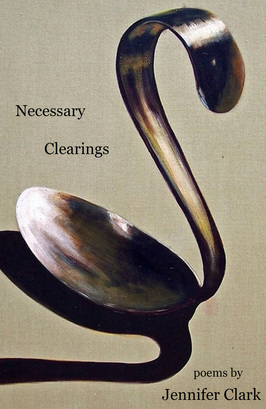
Nominated for a Rhysling Award and two Pushcart Prizes, Jennifer Clark ’s poems and short stories have been published in numerous literary journals and anthologies. Failbetter, Poemeleon, The Midwest Quarterly, Windhover, Main Street Rag, Storm Cellar Quarterly, Solo Novo,Structo, Paper Crow, Spittoon, and pacificREVIEW are some of the journals that have made a home for her writings. Her work has been anthologized in such places as Dogs Singing (Salmon Press), Complex Allegiances (Wising Up Press), Zombies for A Cure (Electrik Milk Bath Press), Pain and Memory (Editions Bibliotekos), Growing Concerns: An Eco-Horror Anthology (Chupa Cabra House), and [Ex]tinction & [Ex]tinguished Anthology (Twelve Winters Press). Her play “Father’s Not There” was featured at the U.S. National Conference on Child Abuse and Neglect. Her short story published in Fiction Fix received their Editor’s Choice Award. She lives in Kalamazoo , Michigan where she is director of community relations for Communities In Schools of Kalamazoo.
Cover art by John Sokol
Purchase Necessary Clearings on Amazon or Barnes and Noble
release date June 29, 2014
“A warning to the reader: you will need an oven mitt to hold this heart-searing book. Replete with vision, wit, and imagistic precision, the poems in this collection enact glacially inside the reader. They gouge out new landscapes and redefine the emotional interior. Jennifer Clark feeds us our spiritual oats in the form of a toddler, a dying friend, a bat attaching itself to the space shuttle during lift off. She makes everything she touches holy. She dips her paint brush into fire and vision creating such potent undertows, we drown and grieve with her. But wait, she seems to whisper to us in other poems, it’s time to get up and dance. She inspires us to bang pots and the lids of pans together like a child and revel in the living. Now open this book and read, become—through the power of her poems—exquisitely human again.” --John Rybicki, author of When All the World Is Old
“In Jennifer Clark’s Necessary Clearings a small girl watching smoke rings “attempts to marry the moment” by sliding one onto her finger, a young mother holding her son admits “even this moment is ending.” Everything in this collection bears witness to the disappearing world, and to Clark’s desire to stay the moment with words. Graylings, gardening neighbors, even freezers die -- “Fix her, fix, her, fix her,” prays the daughter of an ailing mother. Yet death and decaying bones share a world with blueberries and goldfinches and astral nurseries where stars are being born, even if their light will take 22 million years to reach us. Necessary Clearings takes place in the tensions between these truths. These are the poems we need while we wait it out.”
--Susan Blackwell Ramsey, author of A Mind Like This, winner of the Prairie Schooner Book Prize in Poetry
Cover art by John Sokol
Purchase Necessary Clearings on Amazon or Barnes and Noble
release date June 29, 2014
“A warning to the reader: you will need an oven mitt to hold this heart-searing book. Replete with vision, wit, and imagistic precision, the poems in this collection enact glacially inside the reader. They gouge out new landscapes and redefine the emotional interior. Jennifer Clark feeds us our spiritual oats in the form of a toddler, a dying friend, a bat attaching itself to the space shuttle during lift off. She makes everything she touches holy. She dips her paint brush into fire and vision creating such potent undertows, we drown and grieve with her. But wait, she seems to whisper to us in other poems, it’s time to get up and dance. She inspires us to bang pots and the lids of pans together like a child and revel in the living. Now open this book and read, become—through the power of her poems—exquisitely human again.” --John Rybicki, author of When All the World Is Old
“In Jennifer Clark’s Necessary Clearings a small girl watching smoke rings “attempts to marry the moment” by sliding one onto her finger, a young mother holding her son admits “even this moment is ending.” Everything in this collection bears witness to the disappearing world, and to Clark’s desire to stay the moment with words. Graylings, gardening neighbors, even freezers die -- “Fix her, fix, her, fix her,” prays the daughter of an ailing mother. Yet death and decaying bones share a world with blueberries and goldfinches and astral nurseries where stars are being born, even if their light will take 22 million years to reach us. Necessary Clearings takes place in the tensions between these truths. These are the poems we need while we wait it out.”
--Susan Blackwell Ramsey, author of A Mind Like This, winner of the Prairie Schooner Book Prize in Poetry
Hunger Moon by Susan Deer Cloud
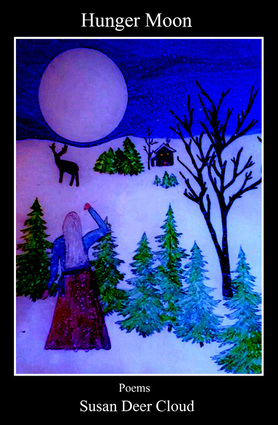
Susan Deer Cloud is a mixed lineage Catskill Mountain Indian who has traveled to and sojourned in many places. She has a B.A. & M.A. in Literature/Creative Writing from Binghamton University and an MFA in Creative Writing/Poetry from Goddard College. She has taught literature and creative writing at the college level. Deer Cloud has been awarded various prizes, fellowships and awards, including a National Endowment for the Arts Literature Fellowship, 2 New York State Foundation for the Arts Poetry Fellowships, an Elizabeth George Foundation Grant, a Chenango County Council for the Arts Individual Artist's Grant, Allen Ginsberg 1st Prize in Poetry (twice) & Prairie Schooner's Readers' Choice Prize in Poetry . Her books include Fox Mountain (Foothills Publishing, 2013), I Was Indian Before Being Indian Was Cool, I & II (Foothills Publishing, 2012), Braiding Starlight (Split Oak Press, 2010), Car Stealer(Foothills Publishing, 2009), and The Last Ceremony (Foothills Publishing, 2007).
Cover art by Dorothy Little Sparrow Watson
Purchase HUNGER MOON on Amazon or Barnes and Noble
Cover art by Dorothy Little Sparrow Watson
Purchase HUNGER MOON on Amazon or Barnes and Noble
"Native American poet Susan Deer Cloud is the master of the long lament, and Hunger Moon is her mournful and magical masterpiece. The work is a song of celebration, but at times her pen becomes a low-sounding cedar flute, searching for that sorrowful note at the bottom of all the holes. When Deer Cloud lets loose one of her salty soliloquies about her mixed lineage mountain people and their exuberant and long-suffering lives, she clears the deck and points the finger at us all. But none of the colorful characters that inhabit Hunger Moon receive more poetic punishment than the poet herself. She wields a self-deprecating style of humor that goes beyond the call of humility. Deer Cloud digs deeper into the back-country Catskill mud she flings to find momentary marvels of wisdom and insight that are simply stunning … sentences of solid gold. At those moments … and there are many … readers will feel they have discovered genius and perhaps touched immortality."
--Evan Pritchard, poet and professor of Native Studies (Marist, Pace, Vassar, etc.) and author of No Word For Time, Bird Medicine, Native New Yorkers.
"Reading Deer Cloud’s words sets in motion a journey for the creative mind that equally stirs the skin, breath, and vision. Her poems resuscitate both new and familiar passions; the deeply honest word-stories expose my own naked soul by poem’s end. In “Bear Hunt,” Deer Cloud writes, “Granddaughter, when I crawl through that membrane separating your life from what people misname my death, I can sometimes weep tears again …” Throughout the book, words like these provide the alchemy that thrills and sparks soul-light and calls into today’s life an amplified truth that inspires the spirit of my own ancestors to dance inside this warmed skin."
--Anecia Tretikoff O’Carroll, M.A. is an Alutiiq interracial adoptee that recently relocated to her blood’s home to reunite with her beloved Alaska Native people. The story of the spirited journey is told in her forthcoming book, Loud Blood Sings Me Home.
"Susan Deer Cloud’s “Hunger Moon” laments the starvation of the soul, the famine of the heart, the death of love. But like her grandmother’s grandmothers, the Clan Mothers of the Longhouse, Susan points us to Spring’s salvation, aborning in the hungry bellies of February. Wrap yourself in Deer Cloud’s words. The truth teller awaits you under the “Hunger Moon.”"
--Paul Hapenny, Metis, is the author of multi-award winning plays “Vig” and “Sacrement”; “Vig” eventually became the film The Money Kings. His Kespukwitk: Land’s End Poems is in FootHills Publishing’s Re-Matriation Chapbook Series of Indigenous Poetry.
"In this, her finest collection of poems so far, Susan Deer Cloud inhabits not the manufactured misery of affluence pretending to grace, but the real pain of gunfire in the night, rape, a racist in Rolex dripping scorn over Latinos, Blacks, and Indians sitting one row over in a classroom, weeping from the attack. Her grace is earned, through mixed blood, discarded by carded Indians and family alike; through death by Dow visited for oil; through living on, as parents die prematurely of poverty and elite coeds dun her for using “I” and meaning herself. This volume is for the sturdy."
--Dr. Barbara Alice Mann, Professor in Honors College at UToledo, Ohio, and author of numerous books, including Iroquoian Women: The Gantowisas and The Tainted Gift.
--Evan Pritchard, poet and professor of Native Studies (Marist, Pace, Vassar, etc.) and author of No Word For Time, Bird Medicine, Native New Yorkers.
"Reading Deer Cloud’s words sets in motion a journey for the creative mind that equally stirs the skin, breath, and vision. Her poems resuscitate both new and familiar passions; the deeply honest word-stories expose my own naked soul by poem’s end. In “Bear Hunt,” Deer Cloud writes, “Granddaughter, when I crawl through that membrane separating your life from what people misname my death, I can sometimes weep tears again …” Throughout the book, words like these provide the alchemy that thrills and sparks soul-light and calls into today’s life an amplified truth that inspires the spirit of my own ancestors to dance inside this warmed skin."
--Anecia Tretikoff O’Carroll, M.A. is an Alutiiq interracial adoptee that recently relocated to her blood’s home to reunite with her beloved Alaska Native people. The story of the spirited journey is told in her forthcoming book, Loud Blood Sings Me Home.
"Susan Deer Cloud’s “Hunger Moon” laments the starvation of the soul, the famine of the heart, the death of love. But like her grandmother’s grandmothers, the Clan Mothers of the Longhouse, Susan points us to Spring’s salvation, aborning in the hungry bellies of February. Wrap yourself in Deer Cloud’s words. The truth teller awaits you under the “Hunger Moon.”"
--Paul Hapenny, Metis, is the author of multi-award winning plays “Vig” and “Sacrement”; “Vig” eventually became the film The Money Kings. His Kespukwitk: Land’s End Poems is in FootHills Publishing’s Re-Matriation Chapbook Series of Indigenous Poetry.
"In this, her finest collection of poems so far, Susan Deer Cloud inhabits not the manufactured misery of affluence pretending to grace, but the real pain of gunfire in the night, rape, a racist in Rolex dripping scorn over Latinos, Blacks, and Indians sitting one row over in a classroom, weeping from the attack. Her grace is earned, through mixed blood, discarded by carded Indians and family alike; through death by Dow visited for oil; through living on, as parents die prematurely of poverty and elite coeds dun her for using “I” and meaning herself. This volume is for the sturdy."
--Dr. Barbara Alice Mann, Professor in Honors College at UToledo, Ohio, and author of numerous books, including Iroquoian Women: The Gantowisas and The Tainted Gift.
Whale Walker's Morning by Michael Shorb
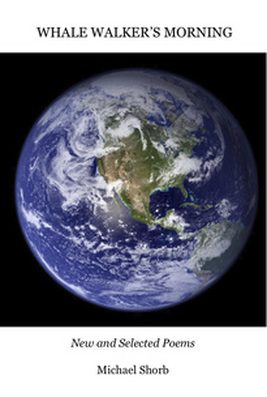
Michael Shorb was a poet, fiction writer, editor, and children's book author. As an international poet, his poetry has been published in more than 100 magazines and anthologies, including Michigan Quarterly, The Nation, The Sun, Salzburg Poetry Review, and Kyoto Journal. He was the recipient of a PEN AWARD, won a Merit Award for the Franklin-Christoph Poetry Contest, and was nominated for a Pushcart Prize. He lived in and loved San Francisco. Michael succumbed to GIST, a rare form of cancer in 2012.
Purchase Whale Walker's Morning by Michael Shorb on Amazon or Barnes and Noble
"Michael Shorb's poems stand as testimony to all that is noble and lasting in the human spirit. He ranges far and wide over human consciousness, taking his time in lyrical gems that balance intellect and intuition. One feels the humanity in these poems-they resonate with our literary fathers while looking, and looming, far into the future." --Neeli Cherkovski
"Cosmic muckraker, whimsical shaman, passionate surreal fabulist, Michael Shorb, walking the backs of whales, trekking ruined rain forests like a new Walt Whitman, herein has charted the maps and kept a keen-eyed, lyrical catalogue of the tragedy of our age....A beautiful, absolutely necessary book..." --Steven Schutzman
"Michael Shorb's lyrical voice, fierce and frolicking, gets inside you and lives." --Anne Valley-Fox
"Michael Shorb's whimsical voice is so steadfast, so authentic, never flinching in the face of all the desecrating activity around us, it lifts us with a delight that redeems our humanity. It certainly lives up to Pound's guiding motto concerning Literachoor: ut doceat, ut moveat, ut delectet: 'Let it teach, move and delight.' He left behind a light for us all." --Eugene Berson
Purchase Whale Walker's Morning by Michael Shorb on Amazon or Barnes and Noble
"Michael Shorb's poems stand as testimony to all that is noble and lasting in the human spirit. He ranges far and wide over human consciousness, taking his time in lyrical gems that balance intellect and intuition. One feels the humanity in these poems-they resonate with our literary fathers while looking, and looming, far into the future." --Neeli Cherkovski
"Cosmic muckraker, whimsical shaman, passionate surreal fabulist, Michael Shorb, walking the backs of whales, trekking ruined rain forests like a new Walt Whitman, herein has charted the maps and kept a keen-eyed, lyrical catalogue of the tragedy of our age....A beautiful, absolutely necessary book..." --Steven Schutzman
"Michael Shorb's lyrical voice, fierce and frolicking, gets inside you and lives." --Anne Valley-Fox
"Michael Shorb's whimsical voice is so steadfast, so authentic, never flinching in the face of all the desecrating activity around us, it lifts us with a delight that redeems our humanity. It certainly lives up to Pound's guiding motto concerning Literachoor: ut doceat, ut moveat, ut delectet: 'Let it teach, move and delight.' He left behind a light for us all." --Eugene Berson
A Slow Education by David Giver
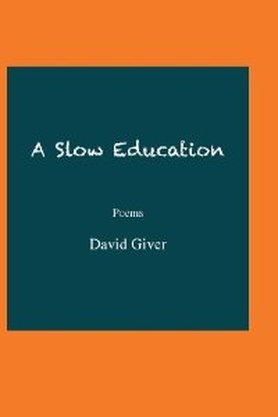
David Giver is the author of A Slow Education (Shabda Press, 2013) and How to Commit Suicide (Unthinkable Creatures, 2013). He is on the staff of the Southern Poetry Review, and he teaches at Armstrong State University.
Purchase A Slow Education by David Giver on Amazon or Barnes and Noble
"What makes us men and fathers? What made our fathers men? How does experience push our life path without us knowing and what does it mean when we figure it out years later? David Giver's A Slow Education defines identity through review and training. It's an exploration of understanding that calls us back to our own importance and interpretation of our lives in the most significant ways. It reminds us that what it takes to BE is what being is - and being saved travels by us on endless tracks that we need to jump on. The trauma of life laid out in words bare on paper in remembrance of how we are taken and given life at the exact same time - a wash so hard to bare and a merciless love that is defining in its depth. Complete. Important. These words in their honest simplicity become poignant to the rise up and move forward way... you can't help but know even if everything hurts. Everything helps." --Steven Hazen Williams, Fight for your Frequency
Purchase A Slow Education by David Giver on Amazon or Barnes and Noble
"What makes us men and fathers? What made our fathers men? How does experience push our life path without us knowing and what does it mean when we figure it out years later? David Giver's A Slow Education defines identity through review and training. It's an exploration of understanding that calls us back to our own importance and interpretation of our lives in the most significant ways. It reminds us that what it takes to BE is what being is - and being saved travels by us on endless tracks that we need to jump on. The trauma of life laid out in words bare on paper in remembrance of how we are taken and given life at the exact same time - a wash so hard to bare and a merciless love that is defining in its depth. Complete. Important. These words in their honest simplicity become poignant to the rise up and move forward way... you can't help but know even if everything hurts. Everything helps." --Steven Hazen Williams, Fight for your Frequency
Light at Point Reyes by Joan I. Siegel
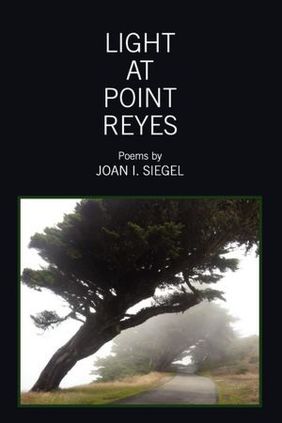
Author of HYACINTH FOR THE SOUL and co-author of PEACH GIRL: POEMS FOR A CHINESE DAUGHTER, Joan I. Siegel received the New Letters Poetry Prize and Anna Davidson Rosenberg Award. A finalist for The Poetry Foundation’s Emily Dickinson First Poetry Book Award and Nimrod’s Pablo Neruda Prize, she lives in New York’s Hudson Valley with her husband, daughter and cats.
Purchase Light at Point Reyes by Joan I. Siegel on Amazon or Barnes and Noble
"Subdued beauty surrounds the reader from the first breath of Joan Siegel's new book, Light at Point Reyes. If there is a Golden Mean, then Siegel has found it,balancing a realistic vision of a starving, brutal, torn world, and the exquisite joy that comes with small recognitions provided by art and human love. In these poems, I felt the power of Wordsworth, the silky lyricism of Debussy, and the centered presence of an artist, like Georgia O'Keeffe." -- Diane Wakoski, author of Argonaut Rose
"William Faulkner’s assertion that “The past is never dead. It’s not even past” is the leitmotif of Joan Siegel’s Light at Point Reyes. The ghosts of remembered family, landscapes, and selves inhabit these poems in which the speaker looks back over a life of kindnesses and cruelties, comforts and heartbreaks, losses and discoveries. The tone is elegiac, the vision unclouded by nostalgia or sentimentality. And in each poem, Siegel’s musical background seems evident in her impeccable use of sound, rhythm, and pace. Throughout this collection, there echoes “the heart’s metronome, keeping time.” --William Trowbridge
"Although quiet and elegant on their surfaces, Joan Siegel's poems do not shrink from exposing the subtle fractures in a family, mining genealogy for its griefs as much as its joys. This exploration opens into the larger world by allowing interpenetration of memory and imagination, familiarity and foreignness. It is a strategy that pays off in poems that stick with me long after I've closed the book." --Chase Twichell
"Joan Siegel is a poet of rare delicacy and restless observation. Light at Point Reyes conjures up H.D., Wallace Stevens, William Carlos Williams and Emily Dickinson, but at the end of the day, Siegel’s voice haunts our minds and the shape memory of each song enraptures." --Djelloul Marbrook/Stan & Wick Poetry Prize Recipient
Purchase Light at Point Reyes by Joan I. Siegel on Amazon or Barnes and Noble
"Subdued beauty surrounds the reader from the first breath of Joan Siegel's new book, Light at Point Reyes. If there is a Golden Mean, then Siegel has found it,balancing a realistic vision of a starving, brutal, torn world, and the exquisite joy that comes with small recognitions provided by art and human love. In these poems, I felt the power of Wordsworth, the silky lyricism of Debussy, and the centered presence of an artist, like Georgia O'Keeffe." -- Diane Wakoski, author of Argonaut Rose
"William Faulkner’s assertion that “The past is never dead. It’s not even past” is the leitmotif of Joan Siegel’s Light at Point Reyes. The ghosts of remembered family, landscapes, and selves inhabit these poems in which the speaker looks back over a life of kindnesses and cruelties, comforts and heartbreaks, losses and discoveries. The tone is elegiac, the vision unclouded by nostalgia or sentimentality. And in each poem, Siegel’s musical background seems evident in her impeccable use of sound, rhythm, and pace. Throughout this collection, there echoes “the heart’s metronome, keeping time.” --William Trowbridge
"Although quiet and elegant on their surfaces, Joan Siegel's poems do not shrink from exposing the subtle fractures in a family, mining genealogy for its griefs as much as its joys. This exploration opens into the larger world by allowing interpenetration of memory and imagination, familiarity and foreignness. It is a strategy that pays off in poems that stick with me long after I've closed the book." --Chase Twichell
"Joan Siegel is a poet of rare delicacy and restless observation. Light at Point Reyes conjures up H.D., Wallace Stevens, William Carlos Williams and Emily Dickinson, but at the end of the day, Siegel’s voice haunts our minds and the shape memory of each song enraptures." --Djelloul Marbrook/Stan & Wick Poetry Prize Recipient
Pinol : Poems by Sayra Pinto
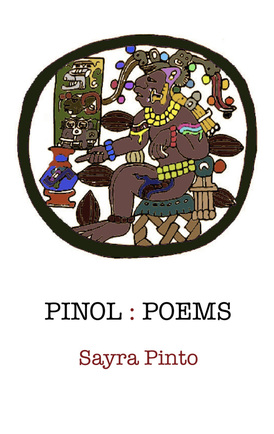
Sayra Pinto is a poet, scholar and activist dedicated to creative change. She is the author of Vatolandia and her work was included in the indigenous anthology, I Was Indian. She has a B.A. from Middlebury College, an M.F.A. from Goddard College, and is currently pursuing her Ph.D. at Union Institute & University. She lives outside Washington, DC with her partner, triplet girls and two spoiled dogs.
Purchase Pinol : Poems by Sayra Pinto on Amazon or Barnes and Noble
"Pinol : Poems by Sayra Pinto is a collection of poems that not only recreates the poet's journey from rural Honduras to the cities of the United States, but, through an ingenious structure using Mayan mythology, the book becomes an urgent archetypal journey of the human life cycle. The journey for Pinto's readers leads to a reconnection not only with a primal self, but with primal nature. In doing so, the book itself becomes a site of transformation into and reconciliation with what is most necessary to be alive in a variegated and omnicultural world. The poems in Pinol, some as short as haiku, some autobiographical, others incantations of spirit, introduce us both to characters from the poet's life, as well as figures from Native spirit life. Most importantly, these staunch, lyrical, and profound poems introduce us to a unique poetic voice from which we turn away at our own risk: we need these poems to heal the fissures that too often divide not only peoples but our individual selves." --Kenny Fries, author of Body, Remember: A Memoir and The History of My Shoes and the Evolution of Darwin's Theory
“Sayra Pinto’s Pinol is much like that mix the wise woman brings together in its title poem, transforming it into the drink that feeds the “hungry belly.” In this honest, raw, earthy, autobiographic-historic-mythic crescendo of brilliant poetry the author serves as wise woman and her mix of words feeds the hungry spirit….Reading Pinol made me remember what it was like when goddesses were not banned and wise women/witches not burned. Be prepared to fly when you enter here.” --Susan Deer Cloud, author of Braiding Starlight
"In Pinol:Poems, Sayra Pinto has written from the place of "jaguars," "snakes" and the illimitable "darkness" both centralized and deflected by the jungles of the Americas….Jungle space mixes with East European space, inner-city North American space, and the speech forms of the early colonies to produce a feminist work that foregrounds the vibration of community over the particularity of language and temperament most often associated with a lyric cycle. The reader is the figure "writh[ing] in the space between them": them: these "endless" and "innumerable" lives.” --Bhanu Kapil, author of Schizophrene
Purchase Pinol : Poems by Sayra Pinto on Amazon or Barnes and Noble
"Pinol : Poems by Sayra Pinto is a collection of poems that not only recreates the poet's journey from rural Honduras to the cities of the United States, but, through an ingenious structure using Mayan mythology, the book becomes an urgent archetypal journey of the human life cycle. The journey for Pinto's readers leads to a reconnection not only with a primal self, but with primal nature. In doing so, the book itself becomes a site of transformation into and reconciliation with what is most necessary to be alive in a variegated and omnicultural world. The poems in Pinol, some as short as haiku, some autobiographical, others incantations of spirit, introduce us both to characters from the poet's life, as well as figures from Native spirit life. Most importantly, these staunch, lyrical, and profound poems introduce us to a unique poetic voice from which we turn away at our own risk: we need these poems to heal the fissures that too often divide not only peoples but our individual selves." --Kenny Fries, author of Body, Remember: A Memoir and The History of My Shoes and the Evolution of Darwin's Theory
“Sayra Pinto’s Pinol is much like that mix the wise woman brings together in its title poem, transforming it into the drink that feeds the “hungry belly.” In this honest, raw, earthy, autobiographic-historic-mythic crescendo of brilliant poetry the author serves as wise woman and her mix of words feeds the hungry spirit….Reading Pinol made me remember what it was like when goddesses were not banned and wise women/witches not burned. Be prepared to fly when you enter here.” --Susan Deer Cloud, author of Braiding Starlight
"In Pinol:Poems, Sayra Pinto has written from the place of "jaguars," "snakes" and the illimitable "darkness" both centralized and deflected by the jungles of the Americas….Jungle space mixes with East European space, inner-city North American space, and the speech forms of the early colonies to produce a feminist work that foregrounds the vibration of community over the particularity of language and temperament most often associated with a lyric cycle. The reader is the figure "writh[ing] in the space between them": them: these "endless" and "innumerable" lives.” --Bhanu Kapil, author of Schizophrene
